






Christian Bauer’s 2021 film, The Ritchie Boys, tells the story of refugees-turned-soldiers during WWII.
“They knew the psychology and the language of the enemy better than anybody else. In Camp Ritchie, Maryland, they were trained in intelligence and psychological warfare. They stayed secret, and saved lives. They were victors, not victims,” according to ritchieboys.org
On Thursday, Nov. 7, the Institute for Holocaust Education, in collaboration with the Nebraska Jewish Historical Society, will show the film in the Alan J. Levine Performing Arts Theater at the Staenberg Kooper Fellman JCC. Admission is free.
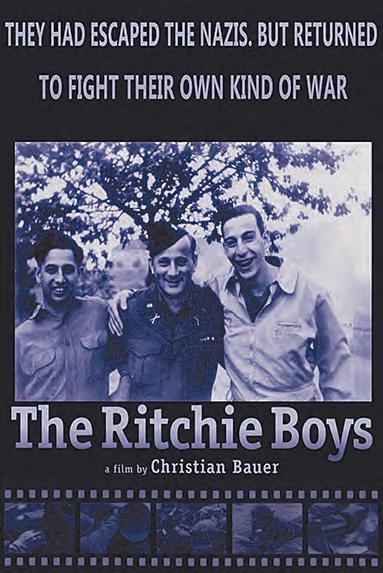
The film will be further illustrated by an exhibit curated by the Nebraska Jewish Historical Society. Several items belonging to Margo Parsow’s father, Warner B. Frohman, who was a Ricthie Boy, will be on display in the Milton Mendel and Marsha Kleinberg Jewish Heritage Center. The Center is located inside the lobby of the JCC.
After surviving everything they went through, the Ritchie Boys never met for reunions; they did not join veteran associations. When the war was over, their German
accents and unusual histories did not make them welcome in the usual veterans’ circles. In the end, the Ritchie Boys quietly left the war behind them and went on to enjoy quite remarkable careers - in arts and politics, in business and academia. They never forgot the war. They just never spoke about it.
In The Ritchie Boys, these remarkable, funny, sharp, brave men share their memories with us. They tell about a war, quite different from the one we have known so far, a war of words. They had no idea what it would be like to see their homeland again, they did not know what had happened to the families and friends they had left behind. On the front lines from the beaches of Normandy onwards, the Ritchie Boys interrogated German prisoners, defectors and civilians, collected information of tactical and strategic importance: about troop size and movements, about the psychological situation of the enemy, and the inner workings of the Nazi-regime. They drafted leaflets, produced radio broadcasts and even published a German newspaper dropped behind enemy lines. In trucks equipped with amplifiers and loudspeakers, they went to the front lines and under heavy
See The Ritchie Boys page 3
AMY BERNSTEIN SHIVVERS
JFO Foundation, Executive Director
Imagine creating a gift that lasts forever, one that ensures the strength and vitality of Omaha’s Jewish community for generations to come. With an endowment at the Jewish Federation of Omaha Foundation, you can do just that—leave a lasting legacy that reflects your values and commitment to our community. Plus, your seed money will grow immediately, with our 25% match.
Endowments are powerful tools for ensuring long-term stability. By establishing or contributing to an endow-
ment, you’re building a permanent fund that will continue to support the causes you care about, long after your lifetime. Here are types of endowments:
annual income that is disbursed directly to the Federation, a Jewish agency or organization for its general, unrestricted use. Your gift supports

By endowing your Annual Campaign gift, you create a permanent fund dedicated to supporting the Jewish Federation of Omaha’s Annual Campaign each year. These funds don’t replace your current annual gift; instead, they ensure that your generosity continues in perpetuity, making an impact year after year on your behalf.
UNRESTRICTED FUND
This type of endowment provides
MARK KIRCHHOFF
JFO Community Engagement and Education
The 22nd Annual Omaha Jewish Film Festival will start on Oct. 27 with Shared Legacies: The AfricanAmerican Jewish Civil Rights Alliance, a documentary of the combined efforts of Jews and African-Americans pressing for society changes for civil rights in the 1960s. The second film on Oct. 28 will be Our (Almost Completely True) Love Story, a comedy of seniors navigating the dating scene in Los Angeles. All four films are shown at the Staenberg Omaha JCC in the Alan J. Levine Performing Arts Theater at 6 p.m. All films will include a brief discussion period following the film, led by the host for the evening.
the evolving needs of the Jewish community, allowing the Federation to allocate resources where they are needed most.
RESTRICTED
With a Restricted Fund, you choose where the income is directed. This may be toward a particular Jewish agency, program, or organization that is close to your heart. Whether you wish to support education, social services, cultural programs, or other vital areas, a restricted fund allows See Secure our community page 3



The Festival continues on Oct. 29 with an intriguing, suspenseful, and sometimes humorous tale Running on Sand. This feel-good “dramedy” is a story of resilience and belonging. In the film, Aumari, a young Eritrean refugee living in Israel, is about to be deported back to his home country. After a spontaneous escape attempt at the airport, he is mistaken for a Nigerian striker (a soccer position), who is supposed to arrive at the same time. Aumari seizes the opportunity and benefits for his change of identity as the new key acquisition for the team of ‘Maccabi Netanya’. Despite the absence of any soccer talent, Aumari is able to cover-up and heal the divisions of his struggling team, while a tender romantic bond with the charmingly unconventional daughter of the team owner is growing.
Ilana Linthicum and Francisco Guzman Jimenez will be the hosts for the evening. Originally from Mississippi, Ilana received a bachelor’s and master’s in history from the University of Nebraska at Omaha. Ilana is currently the Education Administrative Assistant at See Jewish Film Festival page 2

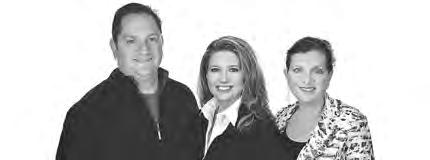

Continued from page 1 Temple Israel where she works closely with the Youth Learning Programs. She has been an active member at Temple Israel since 2017. In her free time, she loves watching and critiquing films, making her very excited to participate in this year’s festival.
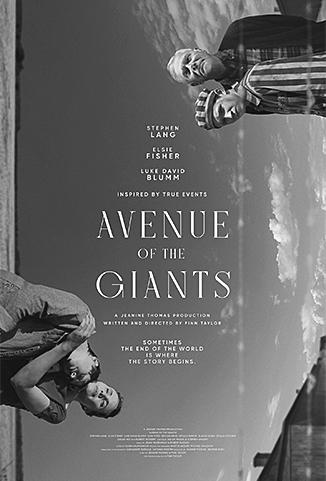

“I don’t know much about soccer,” Ilana said, “but I enjoy a quality film and I’m excited to share Running on Sand, with the community.” She hopes it can shed light on the struggles of refugee and immigrant communities across the world. Francisco was born and raised in Omaha. He has been an active member at Temple Israel since 2021. Currently, he works for Mercy Housing, a national non-profit focusing on affordable housing. “I’m very excited to participate in the film festival, especially because I am co-hosting Running on Sand,” Francisco said. “My father was deported to Mexico in 2020, so this film resonated deeply with me. I am excited for the community to watch this film. I echo Ilana’s hope that it starts some dialogues about the struggles that immigrants go through. It’s a very timely film, and a great reminder to Love the stranger.”
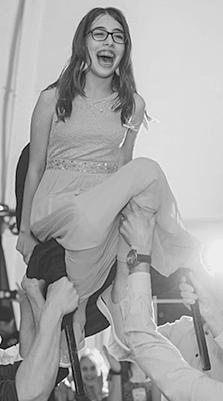


The final opportunity to attend the festival will be on Oct. 30 with the showing of Avenue of the Giants. Stephen Lang and Elsie Fisher star in a heartwarming generational odyssey of healing and discovery set in Northern California. An extraordinary friendship blooms between an aging soul and a troubled girl, each bearing unspoken pains. For over 60 years, Holocaust survivor Herbert Heller (Stephen Lang), now a toy store owner, concealed his wartime memories even from his family. But as illness looms, he befriends Abbey (Elsie Fisher), a teen grappling with her own buried anguish, inspiring him to open up. By sharing their individual struggles, a path to mutual empathy unfolds, offering newfound purpose and solace. Heartfelt performances traversing haunting historical flashbacks and the serene redwood forests (Avenue of the Giants), capture the unbreakable human spirit, offering hope in dark times and unexpected places.
ZELIG KATZMAN
October 7th, 2023.
A day which will forever live in infamy, one which will elicit feelings of pain and grief until G-d eradicates those emotions forever.
I’m struggling to envision celebrating future Simchas Torah’s after what happened on the last one. I’m sort of relieved that the secular date is the one that is more synonymous with the events of that dark day.
A day that drove home the idea that until the ultimate Messianic redemption, we are still in the same state of Golus (exile), even in our own land and under “our own” government.
A day when we were forced to confront the potent forces of evil still very much present in our world, as much as we’d like to wish them away.
A fitting host for the evening will be Gloria Kaslow. During her 25 years of teaching sixth–12th grade students at Beth El Synagogue, her classes included a two-hour year-long study of the Holocaust – including Holocaust literature – for eighth graders. At the same time, Gloria was a volunteer with the Institute for Holocaust Education founded by Beth Dotan and currently directed by Scott Littky. Gloria says that “The Institute has been instrumental in training teachers and bringing meaningful programs in collaboration with many other institutions to schools and the general public, often using the arts as a teaching tool. Movies are an excellent medium for Holocaust education.” After previewing Avenue of the Giants, she shared, “Over the years I have seen the way in which survivors telling their stories to young people has moved many of them to tears and provided them with first-hand information about the Holocaust. This film tells the story in such a gentle yet truthful manner – I found it moving and I believe you will too.”
Use the QR code in this article to view trailers and purchase passes. You may also navigate to jewishomaha.org, select the “Our Priorities” drop-down. Under “Community Engagement,” click on “Film Festival.” Direct questions to Mark Kirchhoff, 402.334.6463 or mkirchhoff@jewishomaha.org
The festival is generously sponsored by the following Jewish Federation of Omaha Foundation Funds: Ruth Frisch & Oscar S. Belzer Endowment Fund; the Kenneth Ray Tretiak Memorial Fund; the Foundation IMPACT Grant; the Special Donor Advised Fund of the Jewish Federation of Omaha Foundation; the Miller Film Fund by Lindsey Miller-Lerman in memory of her parents Avy and Roberta Miller, and the Klutznick Creighton Custodial Fund. Additional support by the B’nai B’rith Henry Monsky Lodge.
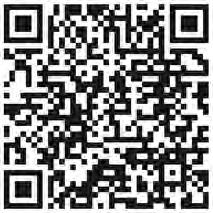
have the Jewish children the teens of Be’eri will never have. The rivers of blood spilled on that horrible day have long dried up, but small Jewish children are still captive in Gaza. Young Jewish soldiers are still risking their lives to return
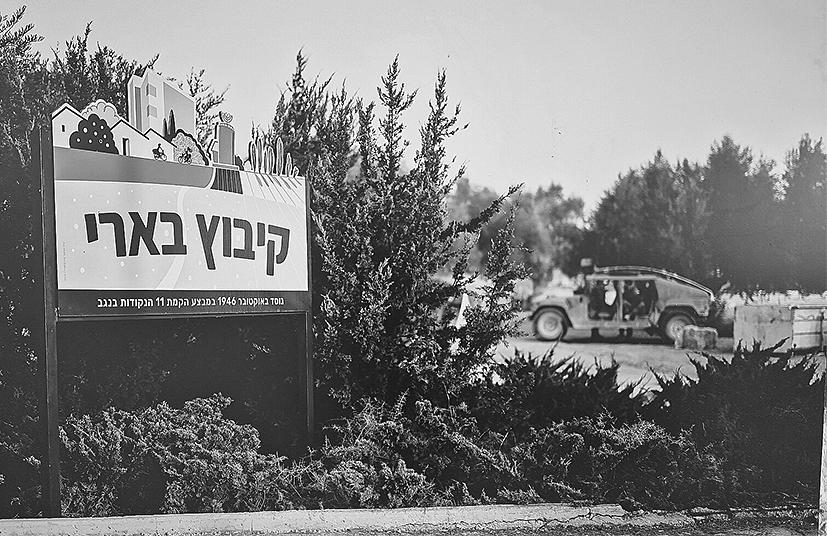
A day when millions of Jewish hearts broke irreparably, when we were forced to turn to our Heavenly Father. Maybe to yell at Him, but at least we learned to once again engage in prayer, however angry or broken we felt.
Kibbutz Be’eri after the massacre by Hamas on October 7. Credit: Micha Brikman, licensed under the Creative Commons Attribution-Share Alike 3.0 Unported license.
them to their homes, and to ensure that we never again witness the horrors of that day.
In a sense, it is still October 7th.
A day when Jewish solidarity was reborn, when we once again recognized that what unites us is much more powerful than what divides us. As the old proverb goes: “Blood is thicker than water”.
A day when many of us realized that Judaism is at the core of our identity, for better and for worse. Being a part of this community of fate, as Rabbi J.B. Soloveichik puts it, gives us both a sense of belonging and a sense of duty. To live the uniquely Jewish lives the Angels of Nova will never live, to
Let us pray for their safety and immediate redemption, and may G-d comfort all the mourners of Zion with a speedy redemption and the ultimate consolation: The coming of Moshiach.
Zelig Katzman was born and raised in Omaha, and now resides in New Haven, Connecticut, where he writes and studies Torah. He is passionate about exploring the modern relevance of Torah and Chassidic thought through his work.

ANNETTE VAN DE KAMP-WRIGHT
Jewish Press Editor
We are pleased to announce ‘Write With Us,’ the recent collaboration between the Nebraska Jewish Historical Society and the Jewish Press, will continue in smaller format in the Fall. New workshops are scheduled for Nov. 21, Dec. 19, Jan. 16, Feb. 2, March 20 and April 17 in the Noshery at the Staenberg Omaha JCC. Register by contacting Jessi at jtaylor@jewishomaha.org or Annette at avandekamp@jewishoma ha.org. There is no cost to attend, although donations are always welcome.
If you have wanted to write your family’s story, that great American novel, or you have always wanted to try your hand at poetry, join us! Maybe you are already an accomplished writer, but you would benefit from being in a room with other writers. Perhaps you have convinced yourself you can’t write at all, but would love to try. Everyone, from absolute beginner to professional, is welcome to attend.























Continued from page 1 fire tried to persuade their German opponents to surrender.
The Ritchie Boys were in Paris even before its liberation. They fought in the Battle of the Bulge - in danger of being shot as spies by the Americans because of their accents, and by the Germans who might find out about their backgrounds. They were among those who liberated the concentration camps. They worked for the Nuremberg Trials and determined the policy for the de-nazification of Germany.
Ritchie Boy Fred Howard said:
“I felt rage at what had happened to Europe, I felt rage at what happened to Jews - Europe was raped, by a very powerful, very disciplined, well-oiled military machine”.
Victor Brombert, Professor Emeritus at Princeton said:
“Our teams were bright, available, not always courageous - not always expert warriors, but certainly our heart was in it.”
Guy Stern, Distinguished Professor at Wayne State University in Detroit agreed:
“We worked harder than anyone could have
driven us. This was our kind of war.” Their effort shortened the war and saved many lives on both sides. However, the story of their heroism, their achievements and their long-term impact on military tactics remained forgotten. The film not only tells the story of their bravery, it also reveals the contributions the Ritchie Boys made to the victory over Nazi-Germany. This is a deeply personal account of a decisive moment in history given by the last of the surviving Ritchie Boys.
(Source: www.ritchieboys.com)
Continued from page 1 you to make a meaningful, long-term impact in the area of your choosing.
IMAGINE THE POSSIBILITIES
Endowments offer a unique opportunity to honor a loved one, establish a scholarship, support a passion, or endow your annual campaign gift. With your foresight and generosity, you can ensure that the Omaha Jewish community continues to thrive and grow, no matter what the future holds.
BOOST
There’s never been a better time to make a lasting impact and take advantage of our largest boost! From now until Dec. 31, 2024,





























» Tony grew up the son of immigrants and has dedicated his life to public service as a former teacher, school board member, and State Senator.
» He worked to pass two of the largest tax cuts in Nebraska history, fully fund Nebraska schools, and protect abortion rights.
As the
of
the Jewish Federation of Omaha Foundation will match 25% of any new or additional endowment gift, up to a maximum of $20,000 per gift! This special matching opportunity applies to:
• New Endowments: Minimum gift of $10,000
• Existing Endowments: Minimum addition of $1,000
A $1,000 gift to an existing endowment will also qualify for the 25% match, boosting your contribution further. You can establish your endowment with cash, stock, a gift of real estate or an IRA distribution.
By participating in this program, you are not only strengthening your personal legacy, but you are also ensuring that Omaha’s Jewish community has the resources it needs to meet future challenges and opportunities. Whether your passion is education, social justice, religious life, or cultural preservation, an endowment is a powerful way to make a difference—today and tomorrow.

To learn more about how you can create a Forever Gift for the Omaha Jewish community, visit www.jfo foundation.org, scan the QR code or call me at 402.334.6466.



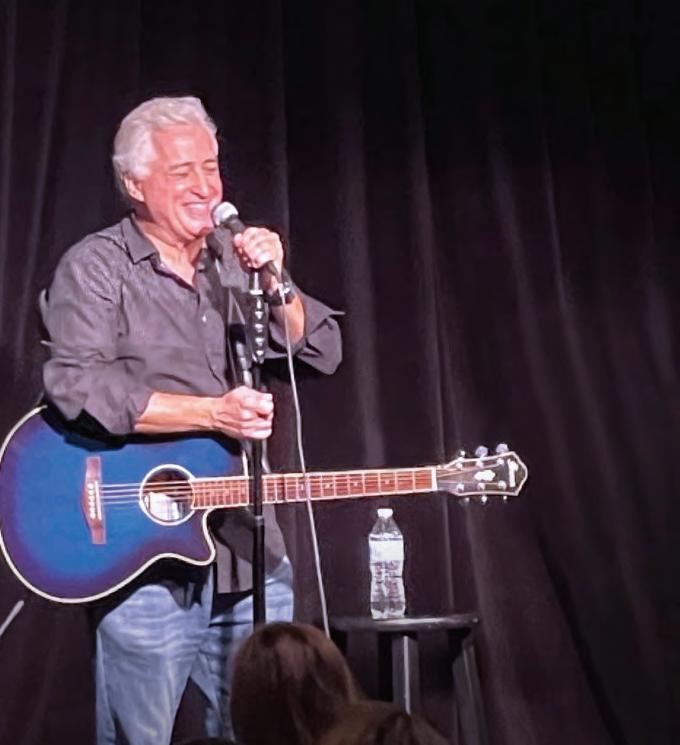
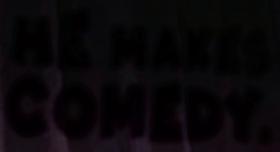

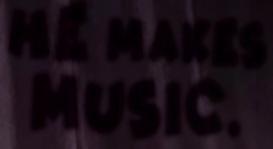
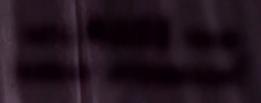


Director of Senior Outreach Shelly Fox has been with the Rose Blumkin Jewish Home since 2003 and is now with Jewish Family Service. She is a seasoned professional whose focus is on supporting and assisting community members, always giving them the time and attention they need.
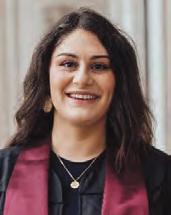
I know everything you’re feeling is a shock to the system. You can barely breathe, let alone think. The only solace you have is going to sleep praying it’s all just some twisted nightmare your brain created, one that will miraculously disappear when you wake up. I know it feels like the world just ended and nothing will ever be the same again. It won’t. Your life is forever altered. Nothing is going to be the same. Simple questions like “How many people are in your family?” “Who’s that in that picture?” “How are you?” Those questions are going to rip open a wound that is still healing. One that will take time, one that will never fully be gone. It is going to be hard; it still is hard. All of this is true, but what is also true is you are strong enough to keep going. You’ll still be able to laugh, enjoy life, and breathe. Some days will feel like doing the bare minimum is all you can do and that is okay. There is no “norm” in grief. There will be nights where crying yourself to sleep is the only way, embrace those nights. Embrace your emotions, don’t run from them. Embrace them and share them with others when they become too much to carry on your own.
Remember people are there for you. Your family, friends, community. They all feel the loss in their own way, and they are there to support you. To listen to you, to talk about them, because no matter how hard it is, talking about them makes
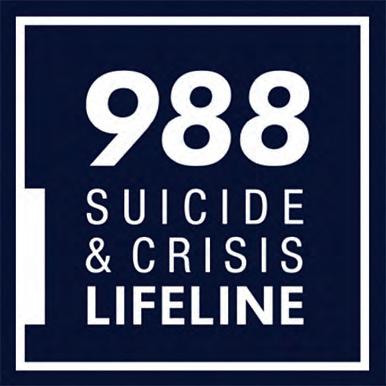
it so much easier. Miss them, grieve them. They are and will always be a part of you and losing them will not be simple. Use your words as an outlet. Written, spoken, sung. They are all ways to express yourself, and to allow you to open your bottled-up emotions. I am here to let you know that you will be okay. You will manage to pick yourself up, go to work, and live. Some days you’ll just be surviving, counting down the seconds till you’ve made it through another day. On the days you get to live, enjoy them. Enjoy any bit of happiness the world provides, because you know how quickly they could be gone. Finally, take everything in ones. One breath, one step, one day. Eventually the one breath will become two, the one step twenty, and the one day five months. It will only still feel like one day, but you’ll have made it, and you’ll keep making it, because you really don’t have any other choice.
This series is sponsored by the Jewish Press and the Jennifer Beth Kay Memorial Fund.
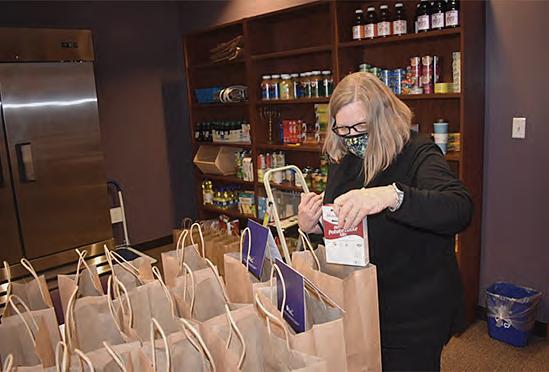
Shelly is sensitive to the challenges they face and reaches out to them with dedication, empathy and kindness. Shelly works with elder clients and their families, with the goal of respecting their desire for independence while keeping them safe and providing for their physical and emotional needs.
Shelly earned a master’s degree in social work from the University of Nebraska, Omaha. In 2019 she received the Employee of the Year award and in 2020 was awarded the Jody and Neal Malashock Award for Professional Excellence.
Sometimes it takes a little extra help to maintain independence... help with meals or handyman services, personal care, transportation, or even medical or legal issues. Jewish Senior Outreach, located at Jewish Family Service, provides that help. Jewish Senior Outreach empowers community seniors in Omaha to stay vital and active in their homes for as long as possible by providing options when independent living becomes more challenging.
We help improve quality of life through proper nutrition, implementing safety precautions, home care referrals and See Jewish Senior Outreach page 5



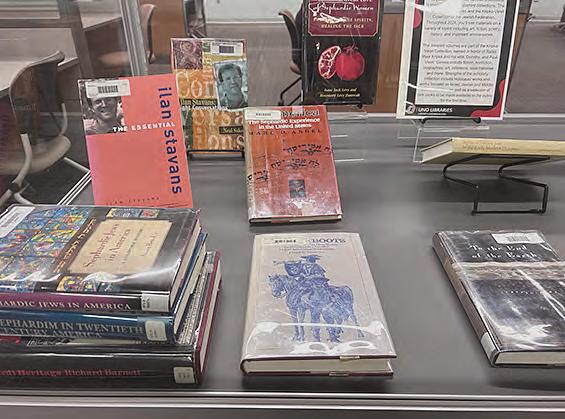
UNO Criss Library Archives and Special Collections Outreach Archivist
UNO Criss Library Archives and Special Collections is curating monthly displays composed of books from the KripkeVeret Collection of the Jewish Federation of Omaha throughout 2024. During October, we celebrate Hispanic Heritage Month and National Coming Out Day. Explore books on these two themes with the KVCJF collection on display on the first floor of Criss Library.
Hispanic Heritage Month celebrates the contributions of Hispanic communities, which are important parts of our nation’s culture, policies, and society. This has included Hispanic, LatinX, and Latine Americans. The KVCJF collection has materials about Sephardic Jews and their experiences in Spain, Portugal, and the United States. The collection also contains items from Jewish individuals and groups living in or immigrating from Latin America, such as Mexican Jewish scholar Ilan Stavans.
National Coming Out Day, celebrated on Oct. 11, honors individuals who have come out, while acknowledging that not everyone is safe to be out and active in the LGBTQIA2S+ communities. The KVCJF has numerous books on this topic, and the relationship between coming out as a member of the LGBTQ+ communities and the Jewish faith and traditions. The items on display are listed below for both book topics. There are many more books in the collection than can be displayed in a single case and we invite you to visit the Archives and Special Collections department to learn more.
The University of Nebraska at Omaha Dr. C.C. and Mabel L. Criss Library became the home to the Kripke-Veret Collection in 2020. The books, donated by the Jewish Federation of Omaha
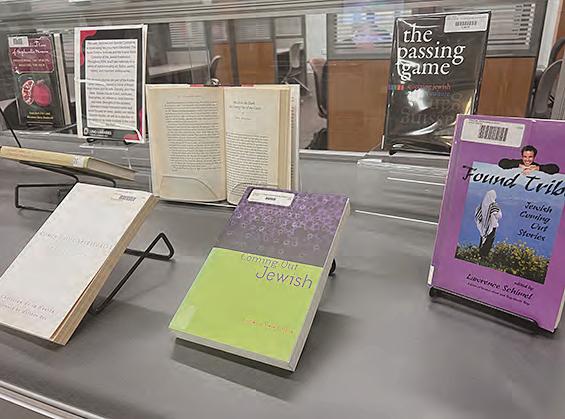
(JFO), contains a hallmark selection of primarily scholarly Jewish works. With an estimated 36,500 volumes, the special collection is the largest donation of books ever to be received by UNO Criss Library Archives and Special Collections.
The cases are available to view on the first floor of Criss Library Monday -Thursday 7 a.m.-10 p.m., Friday 7 a.m.-5 p.m., Saturday 9 a.m.-5 p.m., and Sunday noon- 10 p.m. Archives and Special Collections is open to the public Monday-Friday, 9 a.m.–5 p.m. You can find KVCJF books in the library catalog. If you need help searching the catalog, watch the video guide on our website at unomaha.edu
BOOK LIST
• Found Tribe: Jewish Coming Out Stories
• Coming Out Jewish
• Coming Out Spiritually
• The Passing Game: Queering Jewish American Culture
• The Modern Jewish Girl’s Guide to Guilt
• Sephardic Family Life in the Early Modern Diaspora
• To the End of the Earth: A History of the Crypto-Jews in New
• Mexico
• Roots and Boots: from Crypto-Jew in New Spain to
• community leader in the American southwest
• La America: The Sephardic experience in the United States
• Ritual medical lore of Sephardic women: sweetening the
• spirits, healing the sick
• The Sephardi heritage: essays on the history and cultural
• contribution of the Jews of Spain and Portugal
• Sephardim in twentieth century America: in search of unity
• Sephardic Jews in America: a diasporic history
• The essential Ilan Stavans
• Ilan Stavans: Eight Conversations
MARK KIRCHHOFF
JFO Community Engagement and Education
Beit Midrash is a vibrant place of study, filled with an energetic atmosphere that encourages free-flowing discussion and learning. Our Omaha community-wide Beit Midrash began in 2019, and we’re excited to kick off this year’s first session on Nov. 6 at 1:30 p.m. Both clergy and community members are eager to come together to learn and engage in meaningful dialogue. This space fosters discussion and friendly debate, allowing students and teachers to share ideas and deepen their understanding of Jewish teachings. Such a communal learning environment is essential for personal growth and the preservation of Jewish traditions.
During each Beit Midrash, a different clergy member from our community synagogues will select and present a pertinent topic of their choice. All sessions are held at the Staenberg Omaha JCC. Sessions will be the first Wednesday of each month - with the exception of May which is on the second Wednesday — beginning in November and extending through June. Times are noon-1 p.m. – apart from Nov. 6 which is 1:30-2:30 p.m.
In summary, the sessions, times and presenting clergy are: Nov. 6, 1:30-2:30 p.m. at Beth El Synagogue
Dec. 4, noon-1 p.m. at Temple Israel
Jan. 8, noon-1 p.m. at Chabad of Nebraska
Feb. 5, noon-1 p.m. at Temple Israel
Mar. 5, noon-1 p.m. at Beth Israel Synagogue
Apr. 2, noon-1 p.m. at Beth El Synagogue
May 14, noon-1 p.m. at Chabad of Nebraska
Jun. 4, noon-1 p.m. at Beth Israel Synagogue
We are looking forward to an exciting year of study. For more information about Beit Midrash and to register, use the QR code in this article, or in your web browser navigate to jewishomaha.org, select the “Our Priorities” dropdown menu, and under “Community Engagement,” select “Adult Jewish Education” to reach the Beit Midrash button. Please
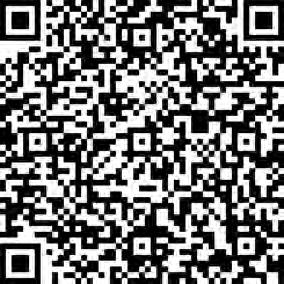
register for each session you plan to attend, as there will be Kosher snacks and beverages provided. With questions, contact Naomi Fox at nfox@jewishoma ha.org or 402.334.6424.
Continued from page 4 financial assistance, if needed. Individuals and their families count on our Outreach social workers as trusted partners. Community members vary from those in good health needing minimum services to those in later stages of illness that may require quite a bit of attention. Many have no family available to assist with managing their care. We meet with family to gather information and establish a relationship. We provide an in-home assessment to make sure the living environment is safe. We also assess the need for home-delivered kosher meals and possible referrals for in-home care.
In some cases, the interventions are short term. Other situations call for more regular home visits, telephone check-ins, daily hot Kosher Meals on Wheels delivery, Lifeline in-home alert services and long-term case management. If needed, we arrange for medical attention and transportation to appointments.
To find out how Jewish Senior Outreach can be a resource for your family, call Shelly at 402.334.6532.

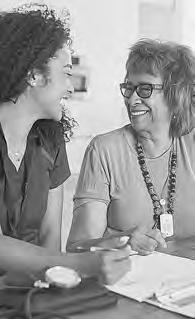
















Owner Bill Claborn


Please let the Jewish Press know in advance when you are leaving and when you are returning. Sometimes several papers are sent to your “old” address before we are notified by the Post Office. Every time they return a paper to us, you miss the Jewish Press and we are charged! Please call us at 402.334.6448 or email us at jpress@jewishomaha.org.
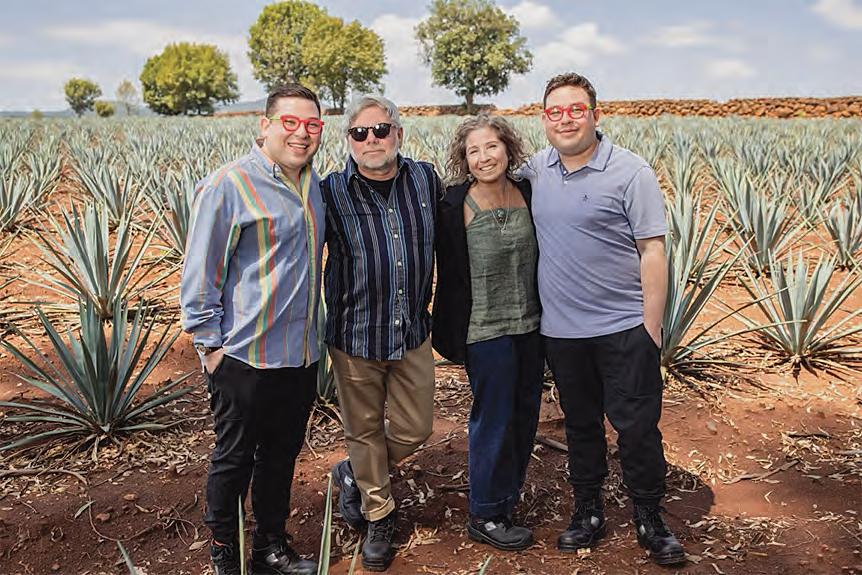
ALAN POTASH
For over 25 years Alan Potash was embedded in American Jewish life. As a professional working for Hillel, ADL and Federation he continuously advocated for and wrote about how to make a stronger connection to Israel and the Jewish world. Alan believed in helping people map out their Jewish Journey. We are reprinting Alan’s blog posts here with his family’s permission.
(Jan 13, 2021) On Jan. 6, 2021, while our elected officials were certifying the election for President-Elect Biden and Vice President Elect Harris, I watched the invasion of the US Capitol by a mob of Trump supporters and extremists.
This was a most unsettling experience. My first reaction was I can’t believe what I am seeing — a mob of people storming the seat of American democracy. This can’t be happening here!
Thanks to television coverage and social media posts we had a front-row seat to something most of us could never imagine happening in this country. There has been a great deal of coverage and analysis of the invasion which will continue for some time.
As I watched, I saw history repeating itself — I thought of the destruction of the Temples in Jerusalem, the start of Kristallnacht, the pogroms of Russia, even the Omaha race riot of 1919. With many of the attackers brandishing Neo-Nazi and white nationalist insignias, could their next target be a Jewish institution? Left unchecked, would they have ransacked the US Holocaust Memorial Museum or found a synagogue to attack? Fortunately, this did not come to fruition but it could have.
Granted, the hatred that this mob demonstrated was not targeted just at Jews but also at people of color, immigrants, and really, everyone that disagreed with them. Parading the confederate flag in the US Capitol demonstrates a level of racism that is unconscionable.
The invasion of the US Capitol was a coordinated effort. The blatant disregard for this institution and what it stands for should disturb all of us. We know these groups are not going away. They have been here for a long time. This type of hatred is nothing new for the Jewish people. We need to do whatever
we can to eradicate antisemitism, bigotry and prejudice.
Our tradition has many tools to address hatred and we should use them now in America, Israel and all corners of the world. For example, we learn parents should teach their children to swim. We also learn from the Mekilta De Rabbi Ishmael that we should teach our children civics and to get along with others.
I bring this up to address the challenges we will face in America in the coming days and years as the House, the Senate and the White House will be controlled by leaders of the Democratic Party. Support for Israel has been a source of responsibility for Jewish Americans and American political leaders. In each administration, there have been ups and downs.
During the Trump administration, we wit-
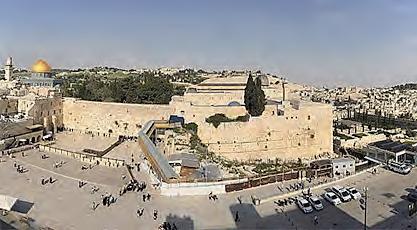
nessed historic support for Israel of a kind that we haven’t seen before. Many advancements in US-Israel relations have been made over the past four years that most likely will not be overturned. I can’t imagine the US Embassy moving back to Tel Aviv nor the recent peace agreements with the UAE and others being rolled back. These advancements have been very positive for Israel and somewhat challenging for the American Jewish community who didn’t support President Trump. These advancements will need to be acknowledged as well as studied to determine the long term strength of the relationship between America and Israel.
Our mutual efforts in Israel and in America will strengthen our relationship so we can counter antisemitism and anti-Israel efforts.
To look towards the future as Americans and Israelis who value the democratic process we know we have serious work to do. The political tides change even as we are left with the debris that is washed up on the shores. We know it is up to us as individuals to make a difference and we can do it together.
RABBI BENJAMIN A. SHARFF
Temple Israel Senior Rabbi








The horrific terror attacks of Oct. 7th continue to reverberate throughout both the Jewish world and the larger world. On Oct. 8th our prayer was, Dayeinu we would grieve those who perished and embrace the return of all of the hostages. Sadly, we know this did not happen. Instead, more violence erupted. Antisemitism spread like wildfire. Places we felt safe and welcomed turned against us. And some in our own community struggle with feeling at home within the confines of our own walls.
But this does not have to be the end of our story. The cycles of violence and recrimina-
tion are not the only way. We are a people who live on hope. Hope for a better day. Hope for a better world. Hope for peaceful co-existence. Hope for a better tomorrow. Until that day comes, may we find comfort in community and in the embrace of loving friends and family. Until that day, we await the return of the hostages and the end of the hostilities. Until that day we pray for all those who are suffering as we grieve our beloved and sacred dead. Until that day, we know that one day peace will reign upon the land, and in the words of Isaiah, our prophet, all shall live under their own vine and fig tree and none shall be afraid.
Whereas,
Jewish Americans are integral to our society and our culture. Their contributions are well-documented—in education, medicine, law, technology and many, many other fields, and Whereas, Despite those accomplishments, Jewish people continue to be a targeted minority in the United States, as further evidenced by data that shows are consistently the most likely of all religious groups to be victimized by incidents of hate. Such incidents are increasing at an alarming rate; and Whereas,

With a surge of antisemitism in the wake of the October 7, 2023, attacks against Israel and Israel’s corresponding defensive actions in Gaza, the attacks against Jewish Americans have increased; and Whereas,
The atrocities committed against civilians in Israel by Hamas have been brutal, barbaric, and baseless, claiming the lives of innocent men, women, children, as well as American citizens; and Whereas,
We continue to stand with Israel in its right to pursue the elimination of Hamas, and other terrorist groups that seek to harm the State of Israel. Including, but not limited to, Iranian backed terrorist groups and Hezbollah; and Whereas, Nebraska supports reaffirming the working definition of antisemitism and also condemns those who back Hamas and similar organizations.
Now, therefore,
I, Jim Pillen, Governor of the State of Nebraska, do hereby proclaim October 7, 2024, as a Day of Observance to Honor the Victims of the October 7th Terrorist Attack on Israel in Nebraska, and I do hereby urge all citizens to take due note of the observance.
In witness whereof, I have hereunto set my hand, and cause the Great Seal of the State of Nebraska to be affixed this seventh day of October, in the year of our Lord Two Thousand Twenty-Four.
JIM PILLEN, Governor
ROBERT EVNEN, Secretary of State

NANCY COREN
On Oct. 1st, one evening before Erev Rosh HaShanah, our phones pinged with a message from Israel’s Homefront Command that we were to take shelter in our saferoom and not come out until we received another message on our phones. This directive was different than the usual Homefront Command directive that one could leave a saferoom ten minutes after a siren ended. Sure enough, the sirens here in Jerusalem and all across the country began blaring loudly warning us of an incoming attack from Iran. Although our steel shuttered window and steel door were closed, we could hear the booms outside, reminding us that the iron dome was doing its job of eliminating the imminent danger.
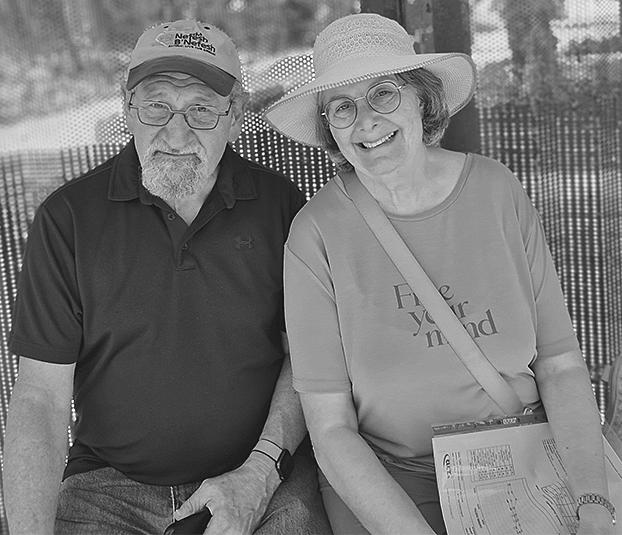
It struck me as Charlie and I were sitting on a bed in our safe room that we had been expecting such an attack and that we were thankful for the Israeli defenses in place to try to ensure our safety. While the attack was going on I was on What’sapp on my computer with a friend in Toronto who was giving me news reports and updates about the situation and I was on What’sapp on my phone with a grandson who was alone in his saferoom and needed reassuring that he was going to be okay.
When the attack ended, we did manage to go to sleep and woke up to a Jerusalem scene that was bustling in final preparations for Rosh HaShanah. Yes, the border police were noticeably present in Zion Square downtown here, but all sorts of individuals of all ages were purchasing wine, challah, food items for the upcoming three days of Rosh HaShanah and Shabbat meals. Not even an evening rocket attack was going to stop us from proceeding with our morning preparatory plans!
I must admit, it was somewhat surreal to be sitting in a saferoom one evening and then the following evening to be sitting in a synagogue with family and friends welcoming in the New Year with
heartfelt prayers. It gave one a sense of gratitude that of the 180 ballistic missiles that had been sent our way, no Israelis were harmed. As a background to Rosh HaShanah the missiles were a reminder of the trauma this country has been through for nearly a year but also of the resiliency displayed time and time again.
On the morning of Rosh HaShanah Day one, as we were walking to shul, we witnessed a young soldier being called up to active duty. He was getting into a car with another soldier while his wife and young baby were standing on the sidewalk to bid him goodbye. It was a scene that was happening all over the country with young reservists being called to go North near the Lebanese border. Although it was likely a familiar scene, it was painful to observe the separation of this family. It was also a reminder of how much gratitude we have for those serving this country to protect its inhabitants from harm.
At synagogue, on that first morning of Rosh HaShanah those of us in attendance recited a group HAGOMEL prayer together. We did not take lightly that we were all safe. We did not take lightly that an attack had taken place that was designed to harm us. May we always be cognizant of the challenges we are facing yet remain hopeful for what the days ahead will bring and thankful for the goodness that is bestowed upon us by HaShem.
From Jerusalem, we send wishes that this coming year will find us all experiencing blessings and that the difficult and sad times will come to an end. May we see the hostages returned, those who are displaced back in their homes, and our soldiers safe from harm. May we also witness a time when peace will prevail and terrorism will no longer threaten humankind.
If you do business with any of our advertisers, please tell them you saw their ad in the Jewish Press. It really helps us!

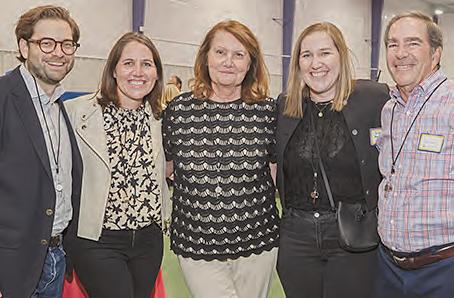
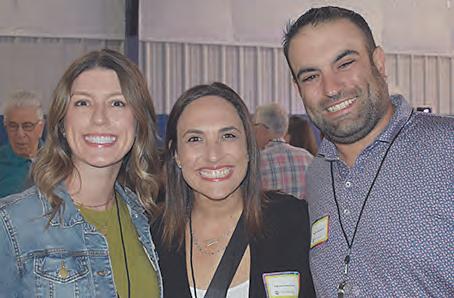
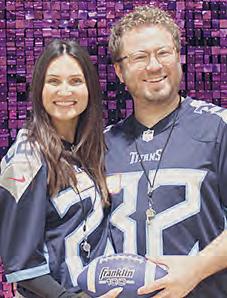
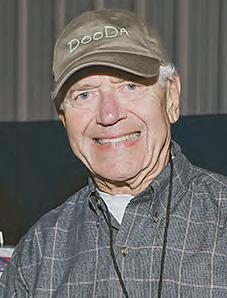
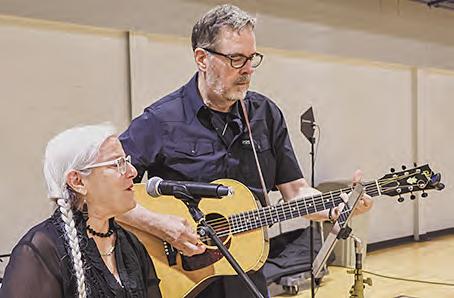
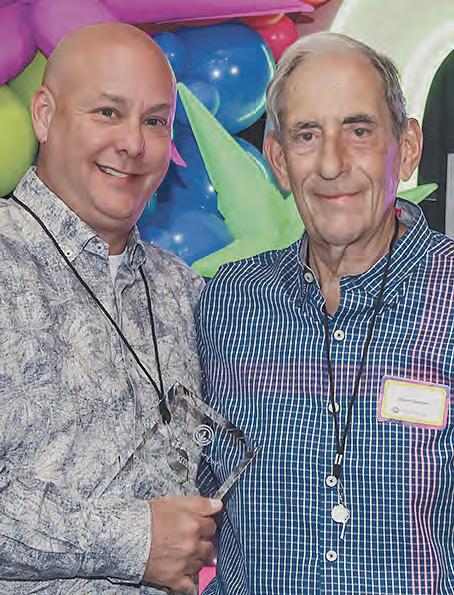
Sunday, September 22, our community came together in the Alan J. Levine Pickleball Court to kickstart the 2025 Annual Campaign. There was food, there was sparkly decor, and there were great speakers; most of all, there was community.
1: Geoff Silverstein, Ally, Robyn, Susan and Bob Freeman; 2: Jess Cohn with Marissa and Bradley Abramson 3: Alena and Jonathan Baker 4: Murray Newman; 5: Lynn Marcus and Pat Aylward 6: Mike Siegel and Norm Sheldon; 7: Mika Mizrahi and the empty chair for the hostages; 8: Campaign Cabinet members Brett Castinado and Lily, Julie, Dr. Eric and Shiri Phillips; 9: Idan Zaccai, Mika Mizrahi and Esther Katz; 10: Nancy Mueller, Dick Kirshenbaum, Cathy Shapiro and Jeanne Bartman; 11: Yosef Seigel and Rabbi Ari Dembitzer; 12: Jodi and Buzz Malashock; 13: Margie Gutnik and Terri Zacharia; 14: Ted and Jamie Friedland; 15: Pat Chudomelka, Dennis and Pam DePorte 16: Ann and Wendy Rosenblatt; 17: Presenters Linda Cohn and Jay Rosenthal, with moderator Kyle Peterson in the middle; 18: Ari and Steve Riekes; 19: Bruce and Cindy Goldberg; 20: Bob Goldberg and Steve Riosenblatt; 21: David Gilinsky and Kyle Peterson; 22: Molline Cassman, Sandy and Amy Friedman; 23: Nancy and Joel Schlessinger; 24: Gary and Lisa Epstein; 25: Mark Sanford; 26: Cantor Joanna Alexander and Rabbi Steven Abraham; 27: Karen and Gary Javitch; 28: Hap and Suzanne Pocras, Sheryn and Arnold Joffe, Mike and Andrea Siegel; 29: Nate and Hannah Schwalb; 30: Scott and Heidi Schneiderman, Josh and Louri Sullivan, Jeff and Danielle Gordman, Rod Kestel and Chris Kestel; 31: Shiri Phillips and her parents, Mindi and Gady Tene; 32: Gail and Irv Veitzer; 33: Sheri and Mike Abramson; 34: Dasha and Jeff Stein; 35: Cynthia Carlson and Fred Tichauer; 36: Tyler, Laurie and Jason Epstein; 37: Molly and Anthony Juritsch; 38: Marty Ricks and Andi Goldstein; 39: Our younger community members got in the game as well; 40: Ted and Amee Zetzman; 41: Carl and Zoe Riekes; 42: Dana Wayne Gonzales and Jan Wayne; 43: Rabbi Mendel Katzman; 44: Kori and Lisa Lucoff and Norm and Suzy Sheldon; 45: The Bagel Boys: David Kutler, Michael Muskin, Tom Friedman. Photo credits: Debra Kaplan, Mark Kirchhoff and Annette van de Kamp Wright.
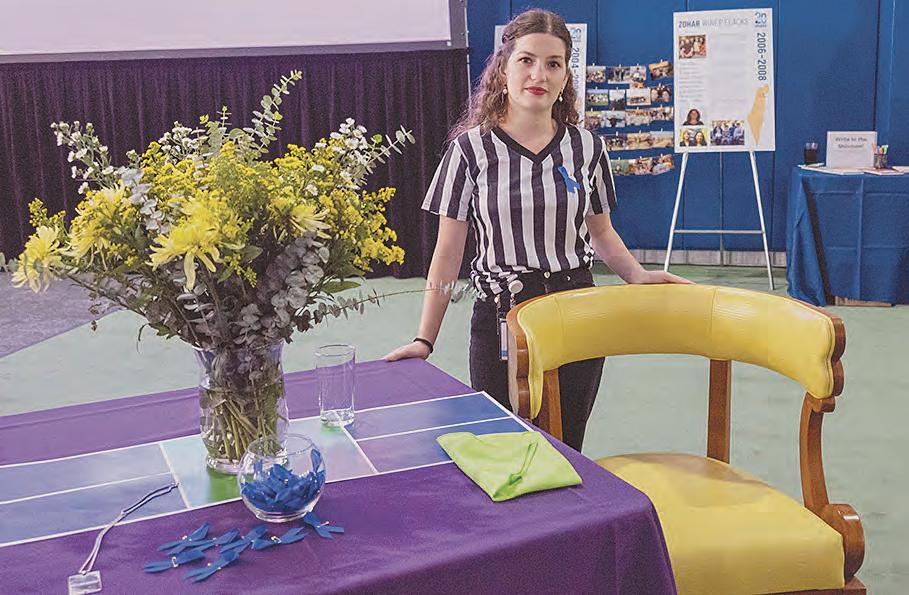
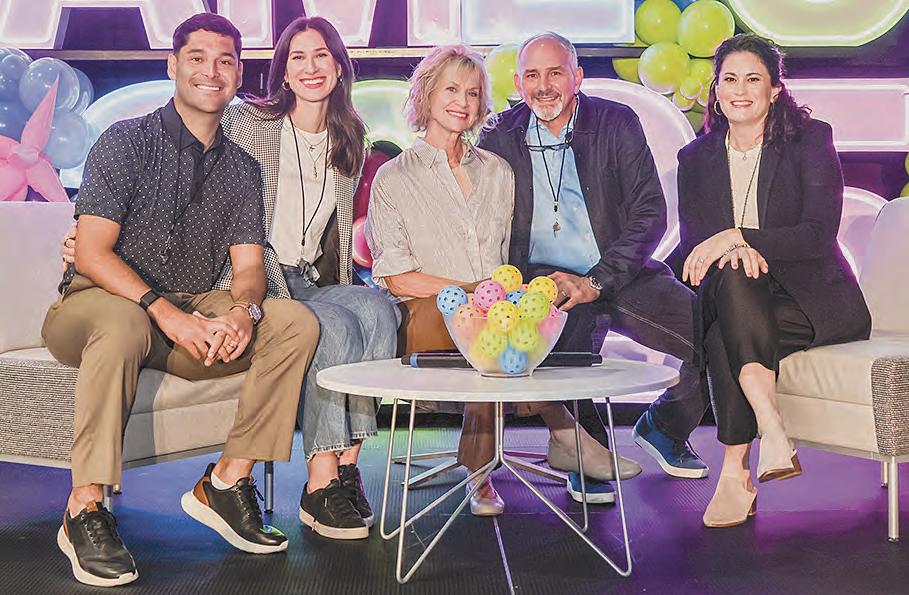
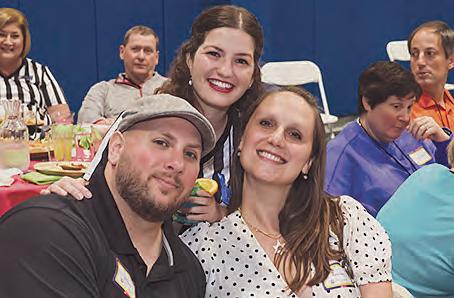
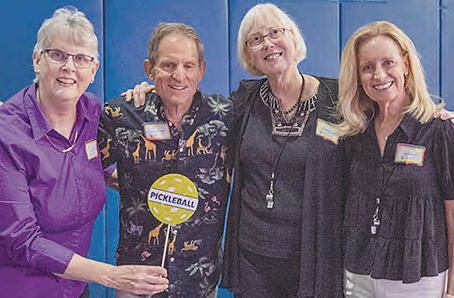
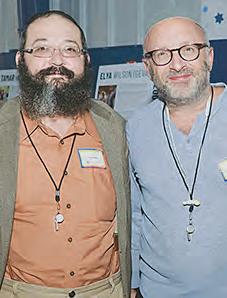
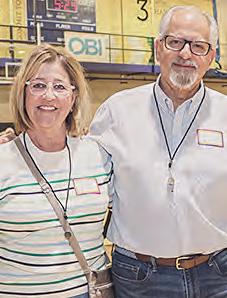
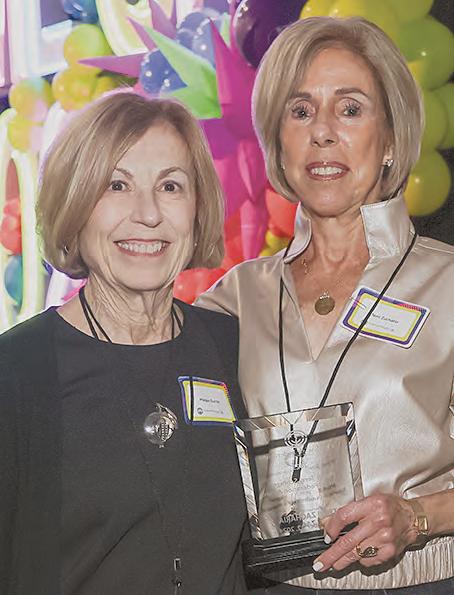
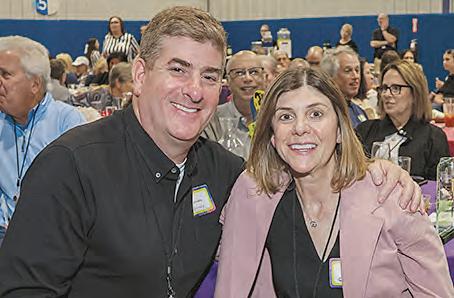
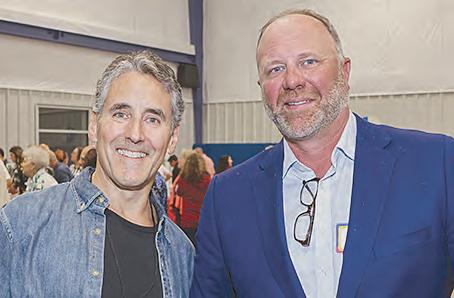
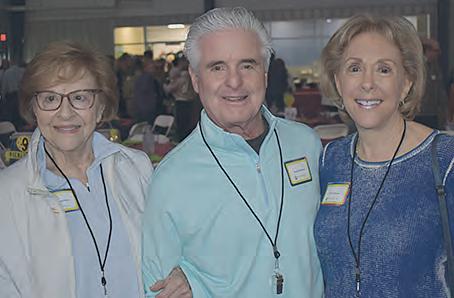
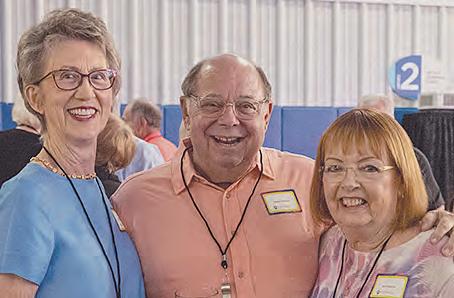
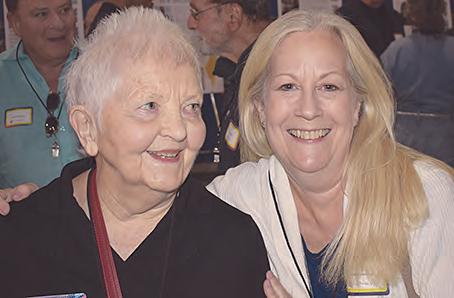
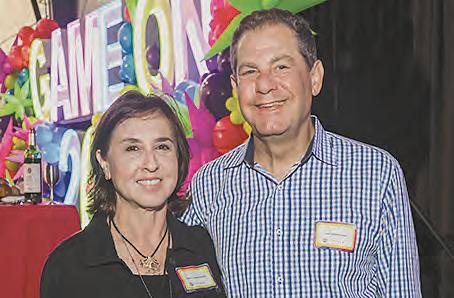
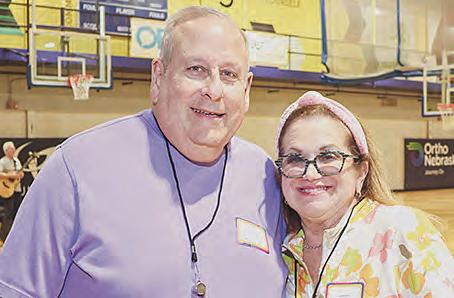
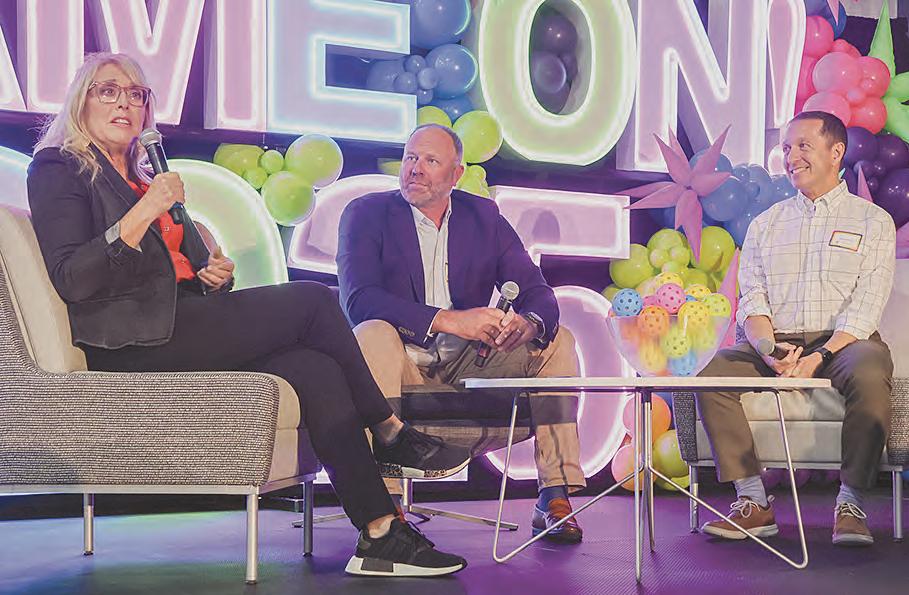
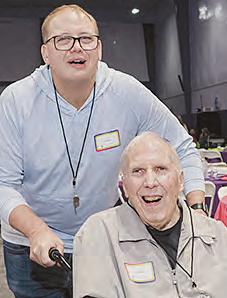
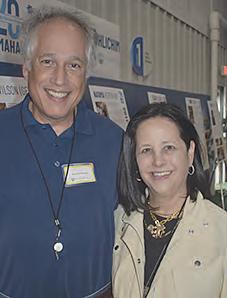
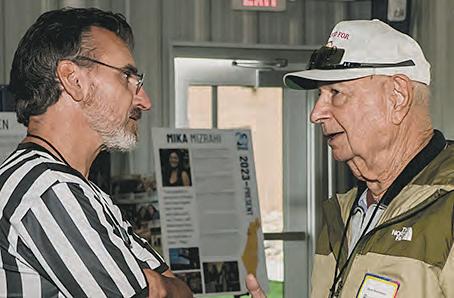
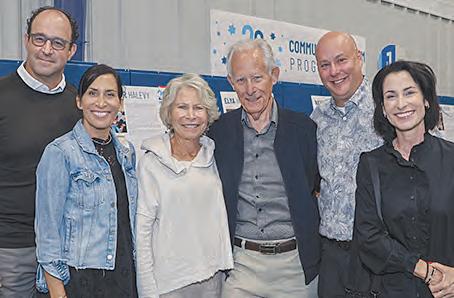
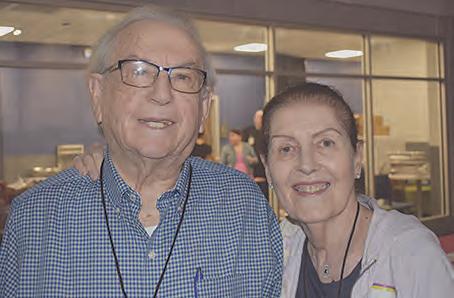
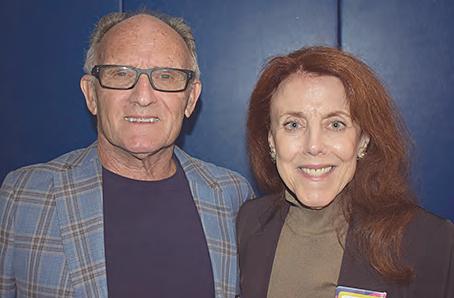
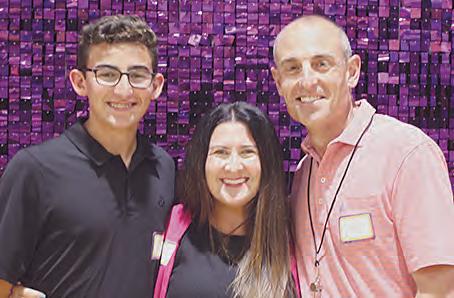
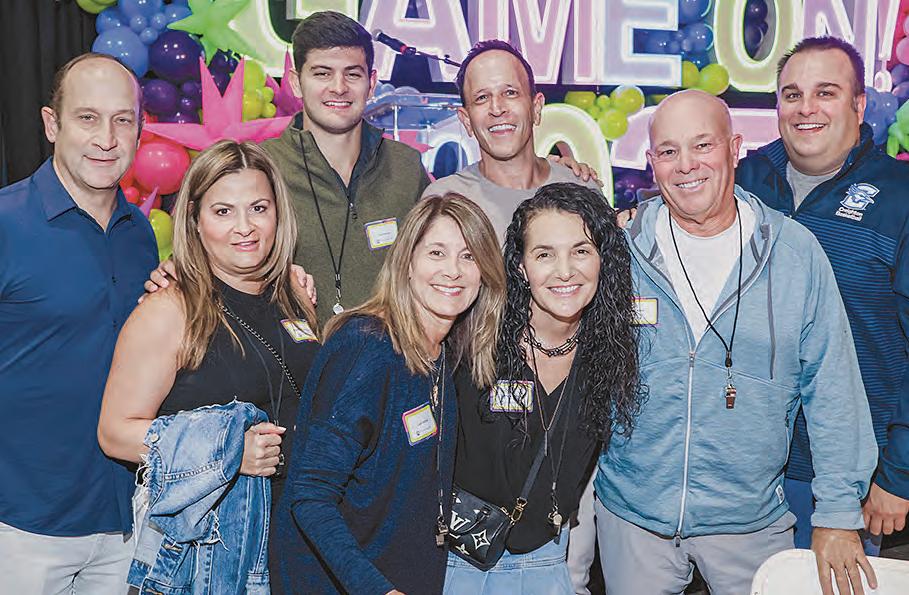
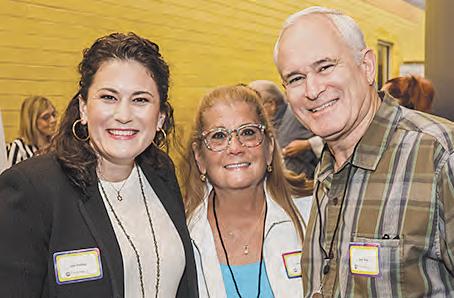
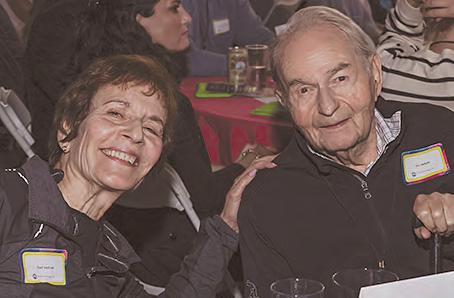
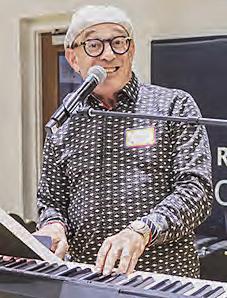
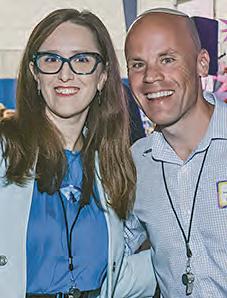
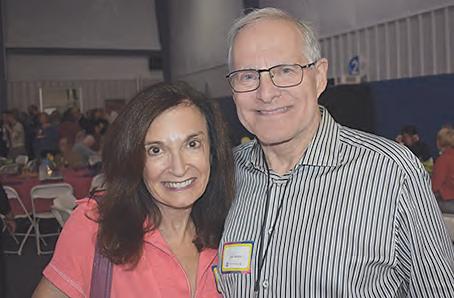
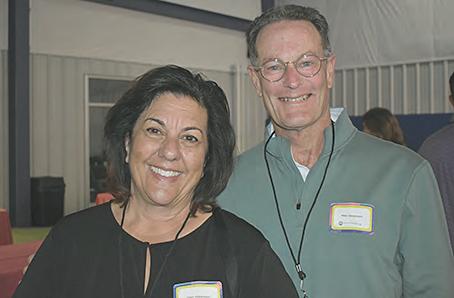
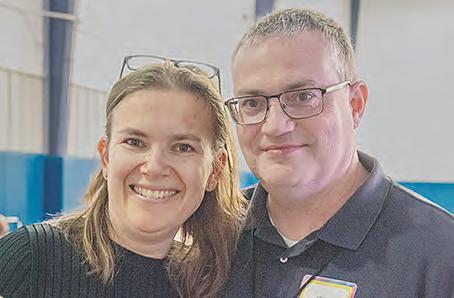
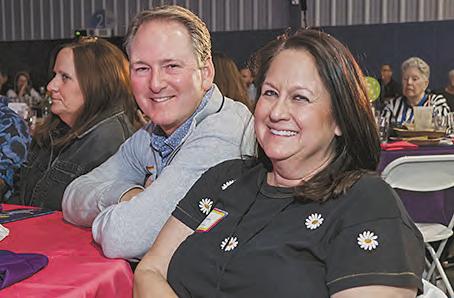
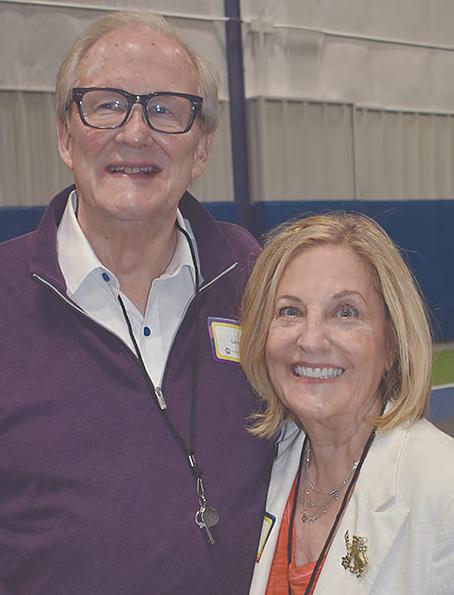
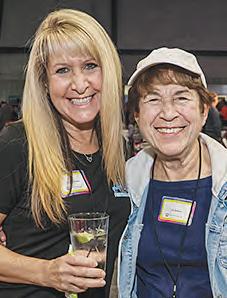
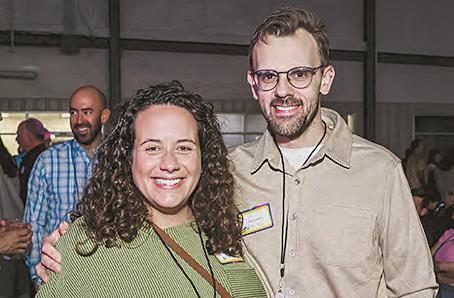
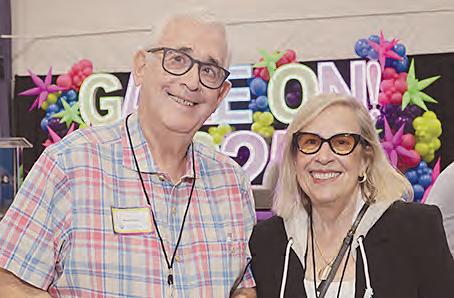
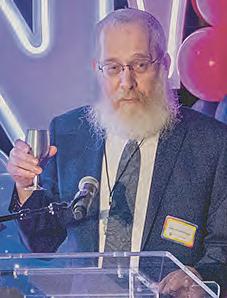
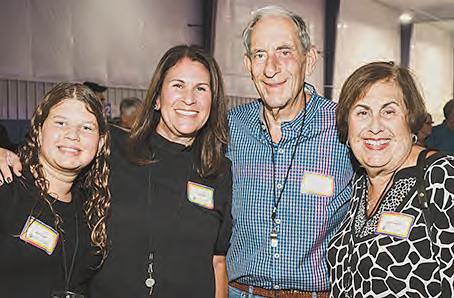
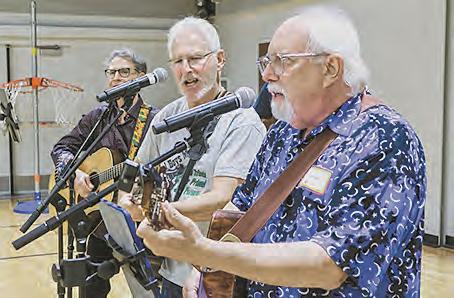
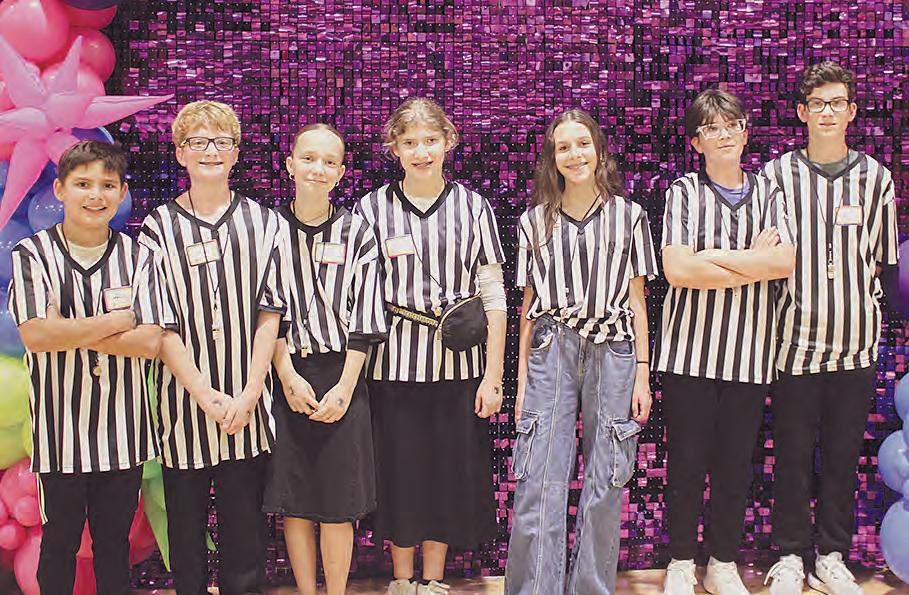



SARAH KELEN
2024 marks the centennial of Lincoln’s South Street Temple. Congregation B’nai Jeshurun was founded in the late nineteenth century. The current building was dedicated in 1924 after the previous Temple building on 12th and D was destroyed in a fire. To commemorate this anniversary, members of some longstanding Temple families are sharing memories about the building and the Temple’s history.
Jay Wolf (Albion, Nebraska) shared these memories of his family’s connection to the Temple, dating back to the 1890s. Jay’s great grandfather was Henry Schlesinger (also the great grandfather of Temple member Rick Kohn). He was one of the congregation’s founding members. Henry’s son, Melvin, Jay’s grandfather Melvin graduated from UNL, Phi Beta Kappa with a degree in chemistry in 1916. He was a member of the ROTC that later became known as the Pershing Rifles. After graduation, but before he was deployed to WWI, he spent some time in Denver where he met his future bride, Florance Guldman, the daughter of a successful Denver dry goods store owner and real estate entrepreneur, L.H. Guldman.
During World War I, Melvin served in France. When he returned after the war, he married Florence and joined L.H. in his real estate business. Jay’s mother, Elaine (Schlesinger) Wolf, grew up in Denver. Melvin was very involved with the Anti-Defamation League (ADL). At one time a floor in the New York City offices of the ADL was named in Melvin’s honor. On Jay’s father’s side, his grandfather Julius Wolf emigrated from Germany in 1885 with his older brother Max. Their father had died and left the boys without prospects in the old country, so their mother gathered up the fare and sent them to live with relatives that had preceded them in America. Max was 16, and Julius was 14. They didn’t know English and didn’t have a trade. They ended up in Albion and established a horsetrading business. When they were ready to get married, Max found a Jewish family in Sioux City, Iowa, that had several daughters. Max married one and later Julius married another. Max and Julius didn’t attend services anywhere: travel was too difficult in those days. They observed the Sabbath and Holy
Days in their homes.
Julius later moved to Denver, which is where Jay’s father, James (Jim), grew up. He spent his summers in Albion. After serving in World War II, he attended Harvard Law School. Upon graduation, he returned to Albion to take over management of the company feedlot and ranch. Jim Wolf met Elaine Schlesinger in Denver. They married in 1949 and moved to Albion. It was Elaine who decided to join the South Street Temple, thus reestablishing the link to the Temple that her father and grandfather had been members of.
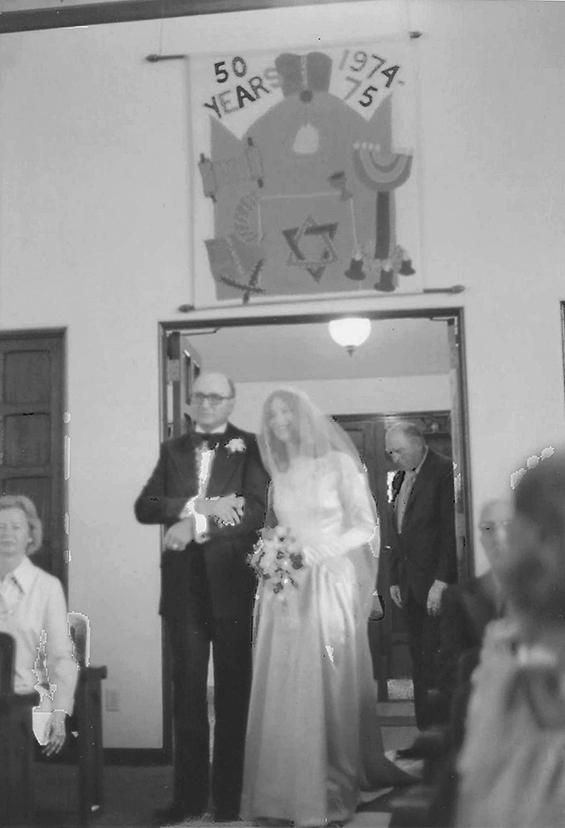
In the second half of the twentieth century and into the twenty-first, there were three Jewish families in Albion: Jim and Elaine Wolf and their four children, Debra, Susan, Jay, and David; Jim’s brother Bob, his wife Hanne, and their son; and Therese Mortensen, her husband Quentin, and their three boys. Jay remembers the families observing the Sabbath in their homes. They always traveled to Lincoln to celebrate the High Holy Days. Jay recalls that “the three families would occupy the second and third rows on the north side. Everyone knew to leave that space for the Albion crew.” There were as many as nineteen when grandparents were included. Longtime Temple members remember Jim Wolf reading the English translation of the Book of Jonah on Yom Kippur, a tradition Jay has taken over after Jim’s death in 2002.
As Jay and his siblings were growing up, Elaine was their primary religious teacher. They had classes every Sunday morning. Elaine would get the curriculum from the Temple and the children were very prepared when it was time to be confirmed. Jay remembers that the kids traveled to Lincoln every Saturday when it was the year of confirmation to get religious instruction from the Rabbi. Melvin got Jim involved in ADL and Jim became very active with ADL. Jim and Elaine loved the South Street Temple and were generous supporters, both with their time and their resources.
Jay says: “I’m the last of the line. I love the old building, especially the beautiful wood carvings. But, the difficult experience of taking my mother and Hanne to services when they were elderly taught me that we need to consider changes” to make it easier for everyone to attend services.
MARK KIRCHHOFF
Community Engagement and Education
On Sunday, Nov. 3, 2024, Rabbi Mordechai Geiger, Assistant Rabbi at Beth Israel Synagogue, resumes his teaching from Duties of the Heart, a series he began in the autumn of 2023. Sessions are from 3-4 p.m. in the Staenberg Omaha JCC and continue the first Sunday of every month.
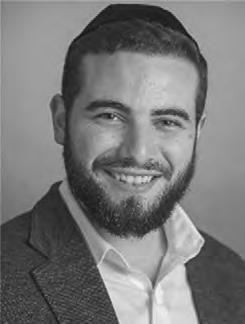
Rabbi Geiger holds a smicha from Rabbi Yitzchak Berkowitz and a Bachelor’s in Behavioral Science and Human Services from Bellevue University where he is currently completing his Master’s Degree. He has embraced Duties of the Heart, a timeless work penned by Bahya ibn Paquda, for nearly a decade as he makes his own spiritual journey. “Duties of the Heart delves into profound teachings of faith, gratitude, and trust. Rooted in logic and philosophy, these principles are meticulously woven into the fabric of Torah teachings,” Rabbi Geiger explains. He will bring his personal understanding and insights to every session. Rabbi’s topic for the first session is Alchemy 101: Turning our Hearts into Gold
Regardless of your Jewish learning or background, these classes are designed for adults seeking spiritual growth and meaning. Whether you’re new to these concepts or have been on a lifelong journey, the Duties of the Heart classes will enrich your understanding. No registration is required—simply join
us to explore these timeless teachings and discover ways to enhance your life beyond what you ever imagined. We look forward to embarking on this incredible journey of self-discovery and spiritual expansion with you.
For more information, contact Rabbi Geiger at mgeiger@ orthodoxomaha.org. Take advantage of this opportunity to learn and share with him.
Children’s Nebraska paid tribute to pediatrician, Dr. Gary Lerner, at a Pediatric Legends event held September 26, 2024, at Children’s Nebraska Hospital. Pediatric Legends are selected by the hospital nominating committee for making a significant contribution over time to pediatric healthcare in the community, serving in a leadership role, being an innovator/champion/pioneer in medicine or pediatric healthcare and/or demonstrating excellence in teaching or research. Dr. Lerner served countless children and their families in his 50 years of work in pediatrics, first as a doctor in private practice and later as a hospitalist at Children’s Nebraska. For over 25 years he was also Medical Director of the Children’s Developmental Clinic which served children with special needs and was the chair of the Medical Ethics Committee for over a decade. Other honorees at the event were Dr. John Colombo, Dr. Richard Lutz, Dr. Stephen Raynor, and Dr. Kenton Shaffer.
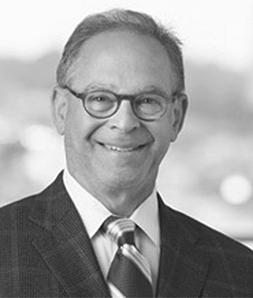
Gary Lerner
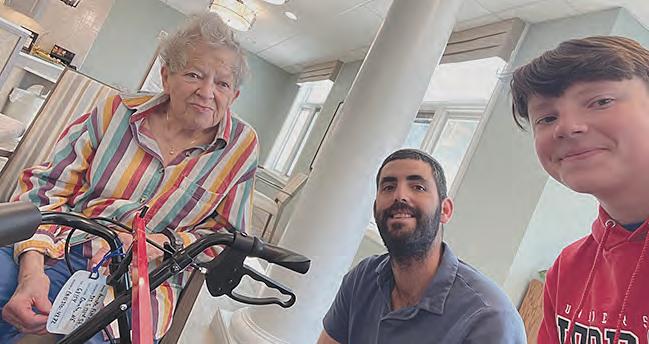
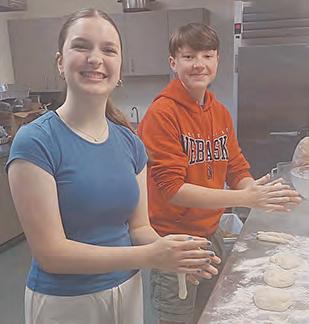
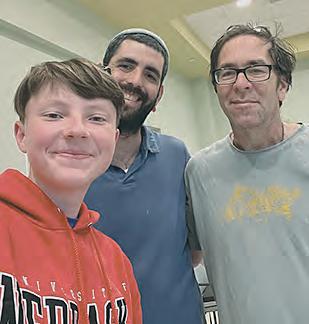
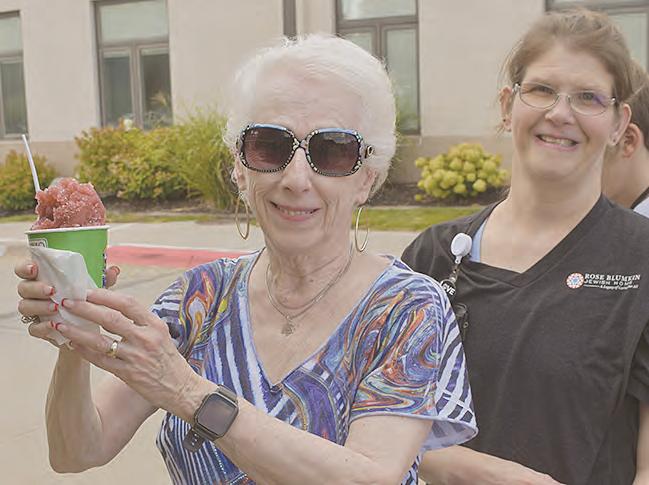
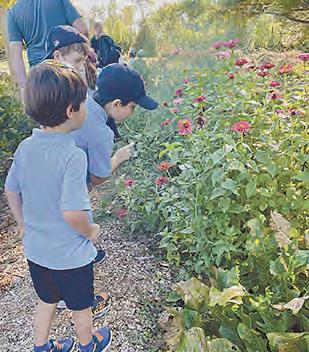
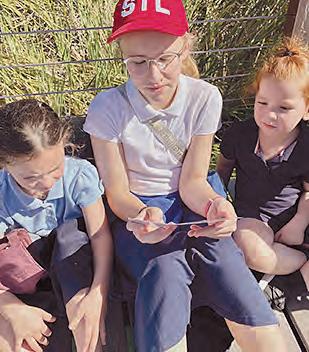
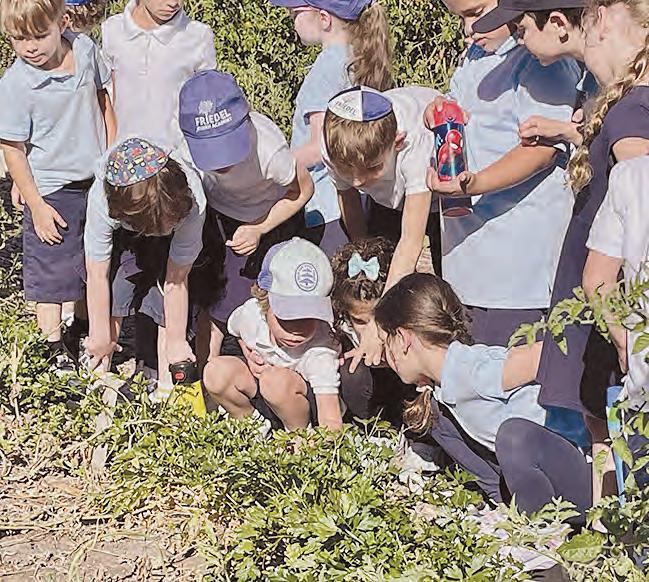
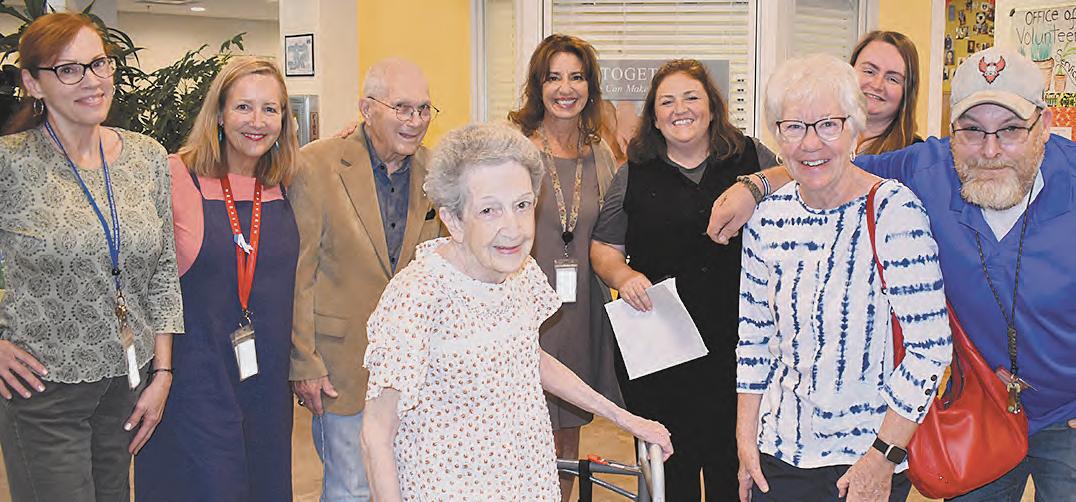
Above, right and below: RBJH receives a visit from lifelong friends! We sincerely appreciate the impact of Terry and Joanie Bernstein's enduring commitment to the Rose Blumkin Jewish Home, a legacy like no other. Their 35 years of involvement, support, and countless hours volunteering with programming and Joanie’s leadership on the JSS/RBJH board have been invaluable to us. They are off on a new journey to be with family in Illinois. Go forth and shine bright in all you do. Good luck, and thank you.
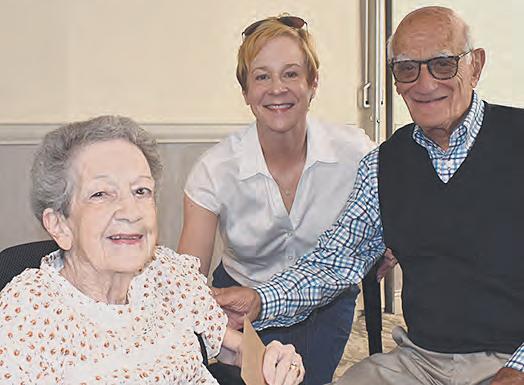
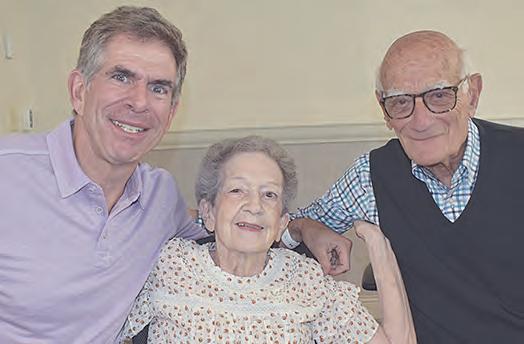
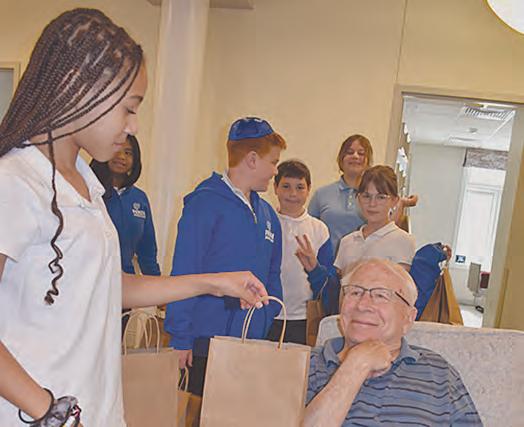
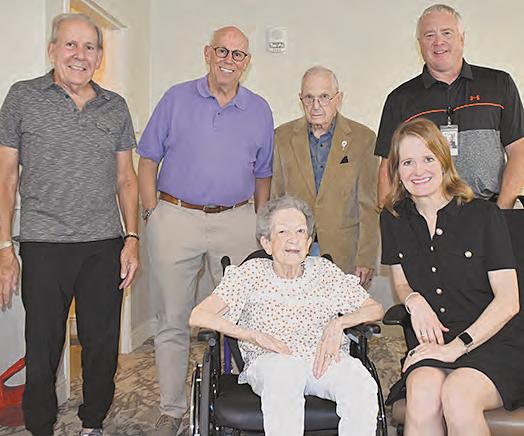

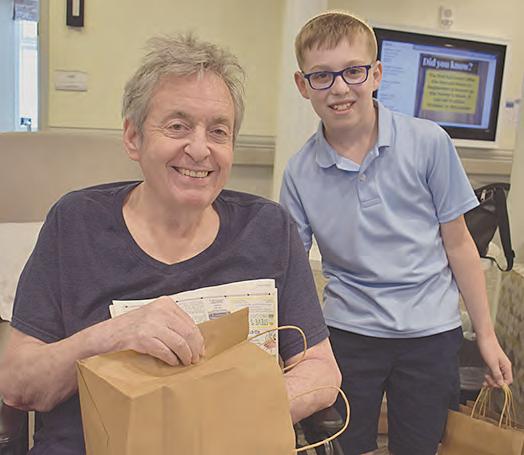
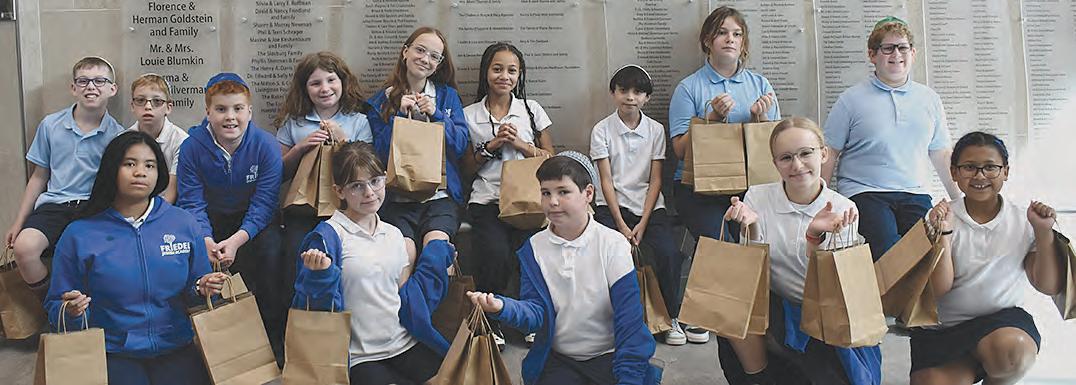
(Founded in 1920)
David Finkelstein
President
Annette van de Kamp-Wright
Editor
Richard Busse
Creative Director
Claire Endelman
Sales Director
Lori Kooper-Schwarz
Assistant Editor
Melanie Schwarz
Intern
Sam Kricsfeld
Digital support
Mary Bachteler
Accounting
Jewish Press Board
David Finkelstein, President; Margie Gutnik, Ex-Officio; Helen Epstein, Andrea Erlich, Ally Freeman, Dana Gonzales, Mary Sue Grossman, Hailey Krueger, Chuck Lucoff, Larry Ring, Melissa Schrago, Suzy Sheldon and Stewart Winograd.
The mission of the Jewish Federation of Omaha is to build and sustain a strong and vibrant Omaha Jewish Community and to support Jews in Israel and around the world. Agencies of the JFO are: Institute for Holocaust Education, Jewish Community Relations Council, Jewish Community Center, Jewish Social Services, Nebraska Jewish Historical Society and the Jewish Press Guidelines and highlights of the Jewish Press, including front page stories and announcements, can be found online at: www.jewishomaha.org; click on ‘Jewish Press.’ Editorials express the view of the writer and are not necessarily representative of the views of the Jewish Press Board of Directors, the Jewish Federation of Omaha Board of Directors, or the Omaha Jewish community as a whole. The Jewish Press reserves the right to edit signed letters and articles for space and content. The Jewish Press is not responsible for the Kashrut of any product or establishment.
Editorial
The Jewish Press is an agency of the Jewish Federation of Omaha. Deadline for copy, ads and photos is: Thursday, 9 a.m., eight days prior to publication. E-mail editorial material and photos to: avandekamp@jewishomaha.org ; send ads (in TIF or PDF format) to: rbusse@jewishomaha.org
Letters to the Editor Guidelines
The Jewish Press welcomes Letters to the Editor. They may be sent via regular mail to: The Jewish Press, 333 So. 132 St., Omaha, NE 68154; via fax: 1.402.334.5422 or via e-mail to the Editor at: avandekamp@jewishomaha.org.
Letters should be no longer than 250 words and must be single-spaced typed, not hand-written. Published letters should be confined to opinions and comments on articles or events. News items should not be submitted and printed as a “Letter to the Editor.”
The Editor may edit letters for content and space restrictions. Letters may be published without giving an opposing view. Information shall be verified before printing. All letters must be signed by the writer. The Jewish Press will not publish letters that appear to be part of an organized campaign, nor letters copied from the Internet. No letters should be published from candidates running for office, but others may write on their behalf.
Letters of thanks should be confined to commending an institution for a program, project or event, rather than personally thanking paid staff, unless the writer chooses to turn the “Letter to the Editor” into a paid personal ad or a news article about the event, project or program which the professional staff supervised. For information, contact Annette van de Kamp-Wright, Jewish Press Editor, 402.334.6450.
Postal
The Jewish Press (USPS 275620) is published weekly (except for the first week of January and July) on Friday for $40 per calendar year U.S.; $80 foreign, by the Jewish Federation of Omaha. Phone: 402.334.6448; FAX: 402.334.5422.
Periodical postage paid at Omaha, NE. POSTMASTER: Send address changes to: The Jewish Press, 333 So. 132 St., Omaha, NE 68154-2198 or email to: jpress@jewishomaha.org
Editorials express the view of the writer and are not necessarily representative of the views of the Jewish Press Board of Directors, the Jewish Federation of Omaha Board of Directors, or the Omaha Jewish community as a whole.
ANNETTE VAN DE KAMP-WRIGHT
Jewish Press Editor
Actress Patricia Heaton, known for her starring roles in Everybody Loves Raymond and The Middle, launched a campaign encouraging non-Jews to put up a mezuzah in support of the Jewish community. It’s aptly named the #MyZuzahYourZuzah Campaign. She’s not Jewish, if you were wondering; she’s Catholic. And a big pro-Israel voice. The campaign is part of her nonprofit, The October 7 Coalition, a Christian group founded after the Hamas attack in Israel last year that supports the Jewish community and Israel.
Of course, this announcement was immediately followed by an online debate. Do we love it? Do we hate it? Is it appropriation? Should non-Jews keep their hands off our ritual objects (even if most of the support-mezuzot have no scroll inside)? Or are we grateful for any support, no matter what it looks like? Would she hide us in her attic?
“For the actual love of G-d, do not misappropriate any more of the Jewish people’s rituals, traditions, & sacred objects,” tweeted Emily Hauser, a Chicago-area communications consultant. “This is so deeply offensive, this AmericanIsraeli Jew first thought it must be a parody. Don’t. Do. This.” (JTA)

Others had a kinder response: “’I think this is a really beautiful gesture of solidarity, and the Jews dunking on this don’t understand how urgently we need our friends and allies to speak up,’ tweeted Eylon Levy, the former Israeli government spokesman.”
I’d like to think of this as a good sign. If we have the energy left to argue over something like this, we must be okay. Not stellar, mind you, not great (never great) but still ok. What better way to flex our argumentative muscles than a Catholic actress who promotes Jewish objects for Christians? And if you don’t know what side of the debate you are on, even better. We can mull this over indefinitely and it will be a distraction from this awful world we live in.
As opinionated as I am, I am not sure what I think of this either. Would Patricia Heaton still speak so highly of us if her life was at stake? Philosemitism can often turn quickly, I’ve noticed. Should famous entertainers stick to their day job and stay out of politics? I don’t always think that. It depends on the entertainer, I guess. Patricia’s actions are better than the alternative, but can we know what she really thinks? After all, this whole thing still comes down to a public persona. Who knows what she says in private.
Remember when Madonna started her Kabbalah journey? I still don’t know how I feel about that either. At the same time, I miss the days when misappropriation was the worst of our problems. I’d much rather they misunderstand us, than wish us dead. What if –bear with me—this war ends, and the world moves on and forgets about all of it? The propally crowd finds a different cause to vandalize for and scream about (animal testing, child labor, just some suggestions), we can open our social media without cringing and don’t have to worry about our favorite rockstars suddenly accusing Israel of genocide. We can wear our Judaism on our sleeves and only encounter ignorance, not hatred. We can bond over kosher Easter chocolate and ugly Hanukkah sweaters in the Wal-Mart gift catalog that misspell the name of the holiday (this didn’t actually happen, but it could).
Would we be able to go back to that life? When the biggest Israel news stories are about a forest fire outside Jerusalem, a small riot in the Westbank, an errant single rocket? When an artist refusing to perform in Israel is an outlier, rather than the norm? (And honestly, my apologies for the many question marks. I can’t seem to write anything lately without excessive unanswered thoughts). I think that world ended October 7. And ever since, we’ve been mourning lost lives, as well as a lost way of life. Our reality is forever altered, and that is incredibly difficult to come to terms with. No amount of mezuzot will change that. I’m sorry, Patricia. But, you know, thanks for trying anyway. Any support is appreciated.
I used to cringe at Rosh Hashanah ‘blessings’ cursing our enemies.
The symbolic foods of the High Holidays have taken on new meaning after Oct. 7, writes a religious studies scholar | JTA
Before the pandemic put a damper on our entertaining, I always looked forward to inviting friends, family and new faculty over for Rosh Hashanah dinner in our Charlottesville, Virginia, home. My favorite part was preparing foods and a fresh text for our Rosh Hashanah seder, a newish custom for Ashkenazi Jews, one with roots in Talmud and generations of practice in Sephardic and Middle Eastern Jewish communities.
Growing up, our Rosh Hashanah dinner featured just a few special foods: the round raisin challah, apple slices dipped in honey, and a new fruit, usually a pomegranate. The extended “seder” we eventually adapted features symbolic foods — simanim in Hebrew — and each food is linked, by its appearance or name, to a different wish for the new year.
On a Rosh Hashanah seder plate you might find the omen foods suggested in the Talmud (BT Keritot 6a): gourd, fenugreek, leeks, beets and dates, foods that “grow and multiply quickly.” The seeds of a pomegranate symbolize fertility and prosperity; a fish’s head is a reference to Deuteronomy 28:13: “God will make you the head, not the tail; you will always be at the top and never at the bottom.”
It’s what anthropologists call an embodied practice: We fully engage in the ritual by speaking words of blessing and eating foods that engage our senses. Many of the food-and-blessings combos feel just right for a family-friendly gathering, like the apples dipped in honey that look forward to a sweet new year.
But others call out for a creative, non-literal English translation, especially the ones imploring God, in one phrasing or another, to vanquish our enemies. For example, “May it be Your will, God, to cut off all our enemies” is traditionally said over leeks, whose Hebrew name sounds like the Hebrew verb meaning “to cut off.”
Of course I know Jews have had multiple enemies over the course of our history. Terrible ones. But as an American Jew — unlike my Israeli friends — having always lived with a sufficient sense of personal safety and well-being, I have been unlikely to feel
anxious about being harmed by enemies. And I am always moved by Bruria, the great woman sage of the Talmud, who chastises her husband Rabbi Meir when he prays for God to smite the wicked people who cause him anguish. Instead, Bruria advises him to pray to God to have mercy on them, so that they will repent. Which is exactly what happens.

So each year I’ve been massaging the anti-enemy blessings paired with the omen foods, because the idea of having enemies or wishing them harm simply seems out of tune with the spirit of the day. And I’m not the only one.
One Reform movement Rosh Hashanah seder text turned the anti-enemy blessing paired with leeks into a wish for our releasing ideas and beliefs that no longer serve us. The traditional date blessing (“May there be an end to our enemies”) becomes instead a hopeful list to end “injustice, apathy, indifference, racism, transphobia and sexism.”
I recall preparing for our Rosh Hashanah seder of 2017, only weeks after violent white supremacists invaded our town carrying Confederate flags and weapons. They stormed past my Charlottesville synagogue that August, calling out “Jews will not replace us!” The Summer of Hate shocked us; racially motivated violence was not supposed to happen in our dear, small American town, not in this day and age. I heard many synagogue friends say, “It felt like Kristallnacht.” How vulnerable the evil and threatening presence made us feel, even after the intruders had left town. Synagogue security went from our remembering to lock the door to the sanctuary after the kiddush luncheon to installing a state-of-theart system to hiring security guards to protect us.
As unnerving as that summer was, I was not moved, in preparing the texts of our Rosh
Hashanah seder for that year, to offer prayers for the demise of our enemies, even those responsible for the death of one local woman, Heather Heyer, and the serious injuries of counter-protesters and bystanders. This sounds touchy-feely, but I was loath to bring in negative energy on this joyous holiday when we are wishing each other happiness, health and sweetness in the new year. Instead, I invited guests to share a vision of how we could do our part to bring healing to our town, with particular attention to tolerating difference, which was a big topic of Charlottesville conversation in the days that followed the summer’s violence.
The first Rosh Hashanah after Oct. 7 is upon us and I still haven’t settled on a Rosh Hashanah seder text that speaks to the circumstances of this moment. I am not without resources. My inbox is filled with suggestions from various rabbinical associations for how traditional holiday liturgies can be shaped or augmented to address the pain of this moment. The Conservative movement, for instance, has posted a document called “Psalms for this Time of Crisis in Israel,” offered as a response to “individual and collective emotions, including grief, fear, rage (even at God), desperation, shock at the incomprehensibility of human evil, faith and doubt, yearning and hope.”
I know this for sure: I can’t keep glossing over the theme of enemies in my text, not after Oct. 7, not when we are days from marking the tragic anniversary when nearly 1,200 people were killed by Hamas terrorists and 250 people who were taken hostage. Israel’s enemies are not vague entities; antisemitism, certainly as we have seen on American college campuses, is palpably real.
And so my omen blessings will be precise: May the people of Israel be safe from enemies who continue to harm them. May our hostages be returned by those who hold them captive. And this year that we pray will be better than the last one, may there be a solution that ends generations of enmity.
Vanessa Ochs is a Professor Emeritus in the University of Virginia Department of Religious Studies.
The views and opinions expressed in this article are those of the author and do not necessarily reflect the views of JTA or its parent company, 70 Faces Media.
Rabbis and liturgists are trying to find ways to honor personal loss and communal grief during Yizkor, the traditional memorial service | JTA
In 2001, Yom Kippur fell on Sept. 26, two weeks after the terror attacks that brought down the World Trade Center. By then, the major denominations had already written special prayers to be said during Yizkor, a prayer service in memory of the dead. The Reform movement posted a prayer in the style of the liturgy said for Jewish “martyrs” and Holocaust victims during the traditional service. “Remember all those who were lost in the terror of that day,” it read. “Grant their families peace and comfort for Your name’s sake.”
Yom Kippur begins this year on Oct. 11, four days after the first anniversary of the Oct. 7 attacks in Israel, and once again rabbis and liturgists are trying to find ways to ritualize raw communal grief on the holy day. A number of groups have put out supplements to the High Holiday prayer book, known as the mahzor, containing reflections, prayers and whole services addressing the mourning and anguish around the day and subsequent 12 months of a crisis that shows few signs of fading.
The entire cycle of this year’s High Holidays is haunted by Oct. 7, especially Simchat Torah, the season’s climax: Hamas breached Israel’s southern fence on the holiday last year, and congregations have been struggling with how to celebrate what is supposed to be a joyous holiday on what is essentially the yahrtzeit, or death anniversary, of some 1,200 victims of the attacks and the kidnapping of hundreds more.
But Yom Kippur too presents challenges after a traumatic year for Jews. The Yizkor service, said during various holidays throughout the year, is often seen as an opportunity for people to commune personally with their own close losses: a parent, a spouse, a child. How do you balance the personal nature of what is supposed to be a day of self-introspection with the communal grief over a devastating attack?
Rabbi Dr. Karen Reiss Medwed said she had that balance — others might say contradiction — in mind when she wrote a ”Yizkor for the Victims Of October 7th” for the Conservative movement.
“You never want to overshadow and make people feel like their personal loss is not being measured in the context of the communal struggles we have,” said Reiss Medwed, a teaching professor emerita of Northeastern University who this year is serving as interim vice provost academic affairs at Hebrew Union College-Jewish Institute of Religion. And yet Yizkor, she added, “is not a static experience. It transforms itself over your lifetime and across your losses. And it can go from being anything from intensely dramatic and challenging to something that is a sweet opportunity to lovingly recall grandparents who passed at a ripe old age.”
Her five-page service includes a call-and-response catalog of victims of Oct. 7 — including “peace-loving youngsters” and
This article is part of a series examining how Oct. 7 and its aftermath have changed the Jewish world. You can see the complete project at JTA.com.
We’ve shed endless tears; we’ve hardened our hearts. We’ve stepped back; we’ve leaned in. We’ve silenced ourselves; we’ve spoken louder than ever. We’ve put on kippahs; we’ve taken down mezuzahs. We’ve lost friends; we’ve built communities. We’ve clung to the news; we’ve shut off our feeds. We’ve grown closer to Israel; we’ve turned away. We’ve shifted to the right; we’ve swung to the left. We’ve opened up; we’ve closed ourselves off. We’ve taken action; we’ve felt paralyzed. We’ve been swallowed by despair; we’ve seen signs of hope.
In some ways, that complicated litany is this year’s version of “We have trespassed, we have betrayed” — the confessional staple of High Holiday liturgy sung by Jews the world over in this season. And it is the sum of what emerged from the Jewish Telegraphic Agency’s reader survey about how life has changed since Oct. 7.
In more than 700 responses, readers from all over and of a wide range of ages and backgrounds shared that they have experienced wrenching changes over the last year because of Hamas’ attack on Israel, the war in Gaza, a rise in antisemitism and the cascading effects that have unfolded in and around Jewish communities around the world.
While many readers reported that they had reordered their personal lives and politics, they showed little commonality or consistency in how they did so. The clearest unifying theme is that — from teenagers to nonagenarians, from New York City to small towns, from Orthodoxy to secular Jews — the Jewish people are struggling right now.
“foreign workers” — that echoes the Eleh Ezkerah, or Martyrology, recited on Yom Kippur. There is a recitation of the kibbutzim and villages that were attacked and an adaptation of the traditional “El Maleh Rachamim” memorial prayer that refers to those who “were cruelly slaughtered on that fateful Simchat Torah.”
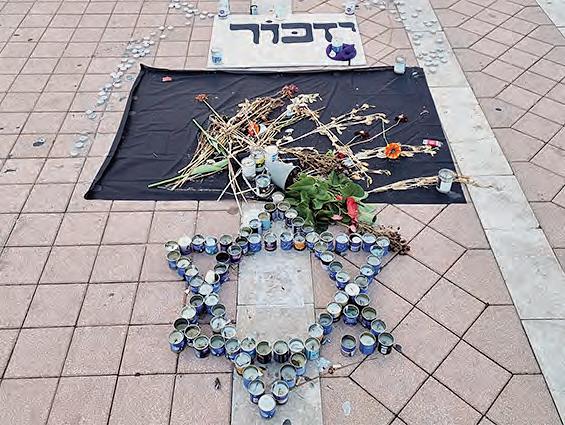
A makeshift memorial to the victims of Oct. 7, featuring candles and the Hebrew word “Yizkor,” or remembrance, in Ashdod, Israel, Nov. 20, 2023. Credit: Maqaf-Ivri/Wikimedia Commons
Rabbi Joel Pitkowsky of Congregation Beth Sholom in Teaneck, New Jersey (where, full disclosure, I am a member), said he will use parts of Reiss Medwed’s liturgy on Yom Kippur. Pitkowsky also saw a challenge in observing Yom Kippur as a day of personal introspection and repentance, and acknowledging “where we are as a Jewish people right now.”
“How do I focus on making myself a better person — all of that work that goes into Yom Kippur,” he said, “and how do I hold on to the incredible, powerful, meaningful and unbelievably sad place where we find ourselves in Jewish history?”
The answer, he suggested, is found in the traditional Yom Kippur liturgy itself, where even personal sins are confessed in the third person, and historical tragedies are recalled in the Martyrology. “Judaism embraces the creative tension between the individual and the group,” he said.
Rabbi Naomi Levy, who wrote a Yizkor meditation for Oct. 7, doesn’t see balancing personal mourning and communal grief over the attacks and the war as a “challenge.”
“It’s a responsibility,” said Levy, who leads the independent Nashuva congregation in Los Angeles. Mourning Oct. 7 “is something people are seeking and need.”
Services at Nashuva will include private time for worshipers to remember a loved one, followed by prayers for the victims of Oct. 7.
The prayer she wrote asks God to remember the victims, and to give strength to those who mourn them. “God of the broken-hearted, God of the living, God of the dead, send com-
As Orit Ramler of North Carolina wrote, “I’m learning to live in a world I never thought I would be part of.”
Here is a collection of what JTA readers said stood out about the year since Oct. 7.
Feelings of grief, anxiety and despair are widespread.
“I feel so much sadness and anger and I could explode from helplessness.” — Esty, 47, Budapest, Hungary
“I am filled with mistrust and grief.” — Rena Fruchter, 69, Philadelphia
“I have less desire to do anything. I feel sad all the time. The future seems so bleak.” — Roberta Roos, 84, Dobbs Ferry, NY
“It has taken the joy out of my life. I feel guilty if I try to enjoy myself knowing that my brothers and sisters in Israel are struggling.” — Henry Glickman, 72, New Jersey
“I carry anger with me wherever I go now and never did before.” — Erin, 53, Falls Church, Virginia
“I have been in a state of constant worry.” — Edward ListonKraft, 69, Chatham, Massachusetts
“I went from a proud, peaceful, loving Sabra to a diminutive, resentful and lonely human being who has practically lost hope.” — Naftali Sabo, 82, Providence, Rhode Island
“I don’t know what to do with, how to handle, the information that reaches me, be it via photos or social media posts or news items. So much is disturbing and I don’t know how to react, the emotions I should feel, how to break down the information.” — Pearl Saban, 62, Toronto
“The weight on me to hold everything has grown exponentially — nuance and complexity and grief and anger and fear and anxiety and trauma and determination — mine and many other people’s. I’m exhausted.” — Rabbi Amy Josefa Ariel, Minneapolis, Minnesota Fear of antisemitism has many of us on high alert.
fort and strength to the grieving, send hope to the children, send healing to Israel,” it reads.
Other supplements written for the first Yom Kippur Yizkor since the attacks hit similar notes, with perhaps different emphasis. Binyamin Holzman’s prayer for the Shalom Hartman Institute’s Ritual Center includes a reference to the biblical character Job, who prayed that the earth would not “cover his blood” and let the injustice of his suffering be forgotten. In a supplement from Svivah, the Jewish women’s empowerment group, Rabbi Melanie Levav writes that Yizkor is necessary because it gives words for mourning a tragedy like Oct. 7 for which “there are no words.”
At Beth David, a Reform congregation in Gladwyne, Pennsylvania, a Yom Kippur afternoon “Yizkor/Memorial Service for 10/7 Victims” will “shift from personal mourning to our communal mourning.”
And some groups will take the rituals of Yizkor to mark Oct. 7 to make a pointed political statement. A coalition of leftwing Jewish groups deeply critical of Israel’s prosecution of the war in Gaza — including Rabbis for Ceasefire, IfNotNow, Jews for Racial and Economic Justice and the anti-Zionist Jewish Voice for Peace — are holding “a mass public ritual of remembrance, refusal, and recommitment” in Brooklyn on Yom Kippur. “This Yom Kippur, let us turn our most holy of holy days into a mass mourning and collective atonement,” reads the announcement of the event, called “Yizkor.”
Such politicization of Yizkor will be rare in U.S. synagogues, however. Rabbi Joel Levenson of Midway Jewish Center in Syosset, Long Island, is typical of many rabbis when he said he doesn’t think his congregants are coming to Yom Kippur services “for the political analysis.”
“As a rabbi I am looking to lead and speak to a congregation of 1,500 and illuminate the power of Torah, which has spoken to our people over our centuries,” he said.
Levenson is adding an innovation to remember Oct. 7: Yizkor is also said on Shemini Atzeret, the penultimate holiday in the High Holiday cycle, and one that coincides with the celebration in Israel of Simchat Torah. Levenson said his synagogue will hold a special Yizkor service on the evening before, to emphasize the discord between the usually joyous holiday and the massacres that took place on it in 2023.
“That evening of Shemini Atzeret will be a space for traditional prayers of Yizkor, but more truly dedicated to a space within a ritual framework to remember and honor those who lost their lives,” he said.
And for his congregation, the anniversary is both communal and personal: Omer Neutra, who was taken hostage on Oct. 7 while serving as a tank commander near Gaza, grew up in the synagogue starting in pre-school.
The views and opinions expressed in this article are those of the author and do not necessarily reflect the views of JTA or its parent company, 70 Faces Media.
“Armed guard at our small-town Wine Country synagogue services, cabbie cap over my yarmulke, the haunted eyes of my Jewish friends — I never thought I’d see these days.” — Neil Ross Attinson, 62, Sonoma, California
“My suspicion that antisemitism was bubbling just beneath the surface was painfully confirmed.” — Nachshon Revach, 46, Brooklyn, New York
“The antisemitism I have encountered as a university teacher in the past year has been shocking. Have I been wearing blinders for the last 30 years?” — Paula Markus, 67, Toronto
“I am now ALWAYS on the alert for any sign of antisemitism. I never used to be this way.” — Barbara Berman, 81, Columbus, Ohio
“I am constantly worried for the Jewish people all over the world and for Israel’s safety. I never used to worry about it and now it’s almost all I can think about. Sometimes it feels debilitating.” — Dorit, 51
Our sense of belonging in the Diaspora has been shaken.
“I feel like an outsider in the place where I grew up. This island is complicated, and so am I, but I always felt I belonged in some way. Now, the pub I used to go to, the falafel cafe — I no longer feel welcome. Some of my friends stopped talking to me. The vibes are rancid.” — Y, 36, Ireland
“In my identity, Jewish now comes first, American, second.” — Jessica Alexander, 55, Ann Arbor, Michigan
“I am no longer confident that I am a valued member of general society.” — Valerie, 49, Vancouver, British Columbia
“I had to sit by and watch my tax money take Israel to the ICJ. It feels isolating and scary.” — Nic, Johannesburg, South Africa
B’NAI ISRAEL SYNAGOGUE
618 Mynster Street Council Bluffs, IA 51503-0766
712.322.4705 www.cblhs.org
BETH EL SYNAGOGUE
Member of United Synagogues of Conservative Judaism 14506 California Street Omaha, NE 68154-1980
402.492.8550 bethel-omaha.org
BETH ISRAEL
SYNAGOGUE
Member of Union of Orthodox Jewish Congregations of America 12604 Pacific Street Omaha, NE. 68154
402.556.6288 BethIsrael@OrthodoxOmaha.org
CHABAD HOUSE
An Affiliate of Chabad-Lubavitch 1866 South 120 Street Omaha, NE 68144-1646
402.330.1800 OChabad.com email: chabad@aol.com
LINCOLN JEWISH COMMUNITY:
B’NAI JESHURUN
South Street Temple
Union for Reform Judaism
2061 South 20th Street Lincoln, NE 68502-2797
402.435.8004 www.southstreettemple.org
OFFUTT AIR
FORCE BASE
Capehart Chapel 2500 Capehart Road Offutt AFB, NE 68123
402.294.6244 email: oafbjsll@icloud.com
TEMPLE ISRAEL
Union for Reform Judaism (URJ) 13111 Sterling Ridge Drive Omaha, NE 68144-1206
402.556.6536 templeisraelomaha.com
LINCOLN JEWISH COMMUNITY:
TIFERETH ISRAEL
Member of United Synagogue of Conservative Judaism 3219 Sheridan Boulevard Lincoln, NE 68502-5236 402.423.8569 tiferethisraellincoln.org
Monthly Speaker Series Service, Friday, Nov. 8, 7:30 p.m. with our guest speaker. Our service leader is Larry Blass. Everyone is always welcome at B’nai Israel!
For information about our historic synagogue, please visit our website at www.cblhs.org or contact any of our other board members: Renee Corcoran, Scott Friedman, Rick Katelman, Janie Kulakofsky, Howard Kutler, Carole and Wayne Lainof, Ann Moshman, MaryBeth Muskin, Debbie Salomon and Sissy Silber. Handicap Accessible.
Services conducted by Rabbi Steven Abraham and Hazzan Michael Krausman.
IN-PERSON AND ZOOM MINYAN SCHEDULE:
Mornings on Sundays, 9:30 a.m.; Mondays and Thursdays, 7 a.m.; Evenings on Sunday-Thursday, 5:30 p.m.
FRIDAY: Sukkot Day Two Morning Service, 10 a.m. at Beth El & Live Stream followed by Soup in the Sukkah; Kabbalat Shabbat, 6 p.m. at Beth El & Live Stream.
SATURDAY: Sukkot/Shabbat Morning Services with Yizkor, 10 a.m. at Beth El and Live Stream; Jr. Congregation (Grades K-12), 10 a.m. Havdalah, 7:10 p.m. at Beth El & Zoom.
SUNDAY: BESTT (Grades K-7), 9:30 a.m.; USY & Gesher Go to Sky Zone (Grades 5-12), noon.
TUESDAY: Board of Trustees Meeting, 7 p.m.
WEDNESDAY: Hoshanah Rabbah Morning Service, 7 a.m. at Beth El & Live Stream.
THURSDAY: Shmini Atzeret Morning Service, 10 a.m. at Beth El & Live Stream; Mincha/Ma’ariv, 5:30 p.m. at Beth El & Live Stream followed by Hakafot 7 Reception; SimTot Torah (Grades K-7), 5:30 p.m.
FRIDAY-Oct. 25: Simchat Torah Morning Service, 10 a.m. at Beth El & Live Stream; Kabbalat Shabbat, 6 p.m. at Beth El & Live Stream.
SATURDAY-Oct. 26: Shabbat Morning Services, 10
a.m. at Beth El and Live Stream followed by the Lerner/Secola/Gold Milestone Anniversary Kiddush Lunch; Jr. Congregation (Grades K-12), 10 a.m. Havdalah, 7 p.m. at Beth El & Zoom.
Please visit bethel-omaha.org for additional information and service links.
FRIDAY: Sukkot; Shacharit, 9 a.m.; Sukkot Lunch (by registration only), 11:30 a.m.; Mincha/Kabbalat Shabbat/Candlelighting, 6:20 p.m.
SATURDAY: Shabbat Kollel, 8:30 a.m.; Shacharit 9 a.m.; Tot Shabbat, 10:30 a.m.; Youth Class, 10:45 a.m.; Tehillim, 5:15 p.m. at the Zivs; Soulful Torah, 5:25 p.m. with Rabbi Geiger; Mincha, 6:10 p.m.; Kids Activity/Laws of Shabbos, 6:40 p.m.; Havdalah, 7:18 p.m.
SUNDAY: Shacharit, 9 a.m.; Kinyan, 9:40 a.m.; Mincha/Ma’ariv 6:20 p.m.
MONDAY: Nach Yomi 6:45 a.m.; Shacharit 7 a.m.; Mincha/Ma’ariv, 6:20 p.m.
TUESDAY: Nach Yomi, 6:45 a.m.; Shacharit, 7 a.m.; Kinyan, 5:45 p.m.; Mincha/Ma’ariv, 6:20 p.m.
WEDNESDAY: Nach Yomi, 6:45 a.m.; Shacharit, 7 a.m.; Candlelighting/Mincha/Ma’ariv, 6:13 p.m.
THURSDAY: Shmini Atzeret; Shacharit, 9 a.m.; Mincha/Ma’ariv, 6:20 p.m.; Candlelighting, 7:11 p.m.
FRIDAY-Oct. 25: Simchat Torah; Shacharit, 9 a.m.; Mincha/Kabbalat Shabbat/Candlelighting, 6:10 p.m.
SATURDAY-Oct. 26: Shabbat Kollel, 8:30 a.m.; Shacharit 9 a.m.; Tot Shabbat 10:30 a.m.; Youth Class, 10:45 a.m.; Tehillim, 5:15 p.m. at the Zivs; Soulful Torah, 5:15 p.m. with Rabbi Geiger; Mincha 6 p.m.; Kids Activity/Laws of Shabbos 6:30 p.m.; Havdalah, 7:09 p.m.
Please visit orthodoxomaha.org for additional information and Zoom service links.
HOUSE
All services are in-person. All classes are being offered in-person and via Zoom (ochabad.com/academy). For more information or to request help, please visit www.ochabad.com or call the office at 402.330.1800.
FRIDAY: Morning Services, 10 a.m. followed by Kiddush Lunch; Candlelighting before, 6:20 p.m.
SATURDAY: Morning Services, 10 a.m followed by Kiddush Lunch; Shabbat Ends, 7:17 p.m.
SUNDAY: Sunday Morning Wraps, 9 a.m.; Sunday Pod (Sukkot Themed), 9 a.m.
MONDAY: Shacharit 8 a.m.; Intermediate Biblical Hebrew Grammar, 10:30 a.m. with Prof. David Cohen; Soup in the Sukkah, noon RSVP at ochabad.com/ soupsukkah; Parsha Reading, 6 p.m. with Prof. David Cohen; Translating Words of Prayer, 7 p.m. with David Cohen.
TUESDAY: Shacharit 8 a.m.; Translating Words of Prayer, 11 a.m. with David Cohen; Intermediate Biblical Hebrew Grammar, 6 p.m. with Prof. David Cohen; Introductory Biblical Hebrew Grammar, 7 p.m. with Prof. David Cohen.
WEDNESDAY: Morning Services 8 a.m.; Mystical Thinking (Tanya), 9:30 a.m.; Introductory Biblical Hebrew Grammar, 10:30 a.m. with Prof. David Cohen; Parsha Reading, 11:30 a.m. with Prof. David Cohen; Sukkah Event, noon ta UNL; Holiday Candlelighting, 6:12 p.m.; Evening Services, 7 p.m. followed by Kiddush and Hakafot.
THURSDAY: Morning Services, 10 a.m.; Yizkor Memorial Service, 11:30 a.m.; Evening Services, 7 p.m. followed by Kiddush and Hakafot; Holiday Candlelighting after, 7:10 p.m.
FRIDAY-Oct. 25: Morning Services, 10 a.m. followed by Kiddush and Hakafot; Celebrating Our Resilience, A Special Hakafot commemorating the victims of the tragedy on Shmini Atzeret on Oct. 7th, 5:30 p.m. followed by Services and Dinner; Shabbat Candlelighting, 6:09 p.m.
SATURDAY-Oct. 26: Shacharit, 9:30 a.m. followed by Kiddush and Cholent; Shabbat Ends, 7:08 p.m.
and Family Game Night, 6 p.m. at SST. Adults and kids of all ages are welcome. Please bring a dish to share; Havdalah, 7:21 p.m.
SUNDAY: Final 2024 SST Gardening, 8:30-10 a.m.; LJCS Classes, 9:30-11:30 a.m. at TI; LJCS/Community Sukkot Celebration, 11 a.m. at TI; Men’s Bike/Coffee Group, 10:30 a.m. at The Mill on the Innovation Campus. For more information or questions please email Al Weiss at albertw801@gmail.com; Sukkah Crawl, 11 a.m.–2 p.m.; Jewish Book Club, 1:30-3 p.m. and will discuss KosherSoul: The Faith and Food Journey of an African American Jew by Michael W Twitty. For more information, please contact Deborah Swearingen at devra 60@gmail.com; Pickleball, 3-5 p.m. at TI. Anyone interested in playing or learning how to play can text Miriam at 402.470.2393. If there are enough interested people; we’ll play in the Social Hall.
WEDNESDAY: No LJCS Classes this week.
THURSDAY: Synagogue Offices Closed for Shemini Atzeret (Yizkor Services), 9:30 a.m. at TI; Simchat Torah, 6:30 p.m. followed by desserts at SST. FRIDAY-Oct. 25: Synagogue Offices Closed; Shabbat Candlelighting, 6:13 p.m.; Kabbalat Shabbat Service, 6:30-7:30 p.m. led by Rabbi Alex at SST.
SATURDAY-Oct. 26: Shabbat Service, 9:30-11 a.m. led by Rabbi Alex at TI; Torah Study, noon on Parshat Bereshit led by TBD via Zoom; Havdalah, 7:11 p.m.
LINCOLN JEWISH COMMUNITY: B’NAI JESHURUN & TIFERETH ISRAEL OFFUTT AIR FORCE BASE
Services facilitated by Rabbi Alex Felch. All services offered in-person with live-stream or teleconferencing options.
FRIDAY: Synagogue Offices Closed for Sukkot Day Two; Shabbat Candlelighting, 6:22 p.m.; Sukkot Shabbat Service, 6:30 p.m. led by Rabbi Alex followed by dinner in the Community Sukkah at TI. Please RSVP to the office and let us know if you have any food allergies or restrictions.
SATURDAY: Sukkot Day Three; Shabbat Service, 9:30-11 a.m. led by Rabbi Alex at TI; Potluck Dinner
What we all should know about Sukkot
The Jewish Holiday of Sukkot begins at nightfall before the 15th of the Jewish (lunar) month of Tishrei, when the moon is full. That’s the evening of Oct. 16 for us this year.It continues for another seven days before leading directly into the holiday of Shemini Atzeret/Simchat Torah.
Sukkot is Hebrew for “booths” or “shelters.” As the verse states, “Your [ensuing] generations should know that I had the children of Israel live in shelters when I took them out of the land of Egypt.”
Sukkot also has an agricultural connotation, marking the time when farmers in Israel would gather the crops that had been drying in the fields.
In addition to the blessing we say before taking the lulav and etrog, whenever you sit down to a meal in the sukkah, you say a blessing that concludes with the words “layshav basukkah,” in which you bless G-d “Who sanctified us with His commandments and commanded us to dwell in the sukkah.” There is intricate choreography one must follow

to properly shake the lulav and etrog. We first recite the blessing, holding the lulav and etrog together, and the pitom of the etrog must be pointed down. Then, facing east, we tilt the pitom upwards and shake them together three times in each of six directions, beginning with east, then south, west, north, up and down. The first time you do each mitzvah you make another blessing, Shehecheyanu, which blesses G-d, Who has “given us life, sustained us, and brought us to this time.”
FRIDAYS: Virtual Shabbat Service, 7:30 p.m. every first and third of the month at Capehart Chapel. Contact TSgt Jason Rife at OAFBJSLL@icloud.com for more information.
TEMPLE ISRAEL
In-person and virtual services conducted by Rabbi Benjamin Sharff, Rabbi Deana Sussman Berezin, and Cantor Joanna Alexander.
FRIDAY: Drop in Mah Jongg, 9-11 a.m. In-Person; Village Walking Group, 10 a.m. In-Person; Tot Shabbat, 5:45 p.m. In-Person; Classic Shabbat Service, 6 p.m. In-Person & Zoom; Oneg in the Sukkah, 7 p.m. In-Person.
SATURDAY: Torah Study, 9:15 a.m. In-Person; Shabbat Morning Service and Bat Mitzvah of Kori Lucoff, 10:30 a.m. In-Person & Zoom; Sushi in the Sukkah with the 20-Somethings, 6:30 p.m. In-Person.
SUNDAY: Grades PreK-7, 9:30 a.m. In-Person; Book Club, 10:30 a.m. In-Person & Zoom.
TUESDAY: Adult Prayer Hebrew: Level Bet, 6 p.m. In-Person; Happy Hour in Sukkah, 6 p.m. In-Person.
WEDNESDAY: Yarn It, 9 a.m.; Grades 3-6, 4:30 p.m. In-Person; Hebrew High: Grades 8-12 6 p.m. InPerson; Community Simchat Torah Dinner and Celebration, 6 p.m. In-Person.
THURSDAY: Simchat Torah Service and Yizkor, 10:30 a.m. In-Person & Zoom.
FRIDAY-Oct. 25: Drop in Mah Jongg, 9-11 a.m. InPerson; Village Walking Group, 10 a.m. In-Person; Shabbat B’yachad Service, 6 p.m. In-Person & Zoom.
SATURDAY-Oct. 26: Torah Study, 9:15 a.m. In-Person; Shabbat Morning Service and B’not Mitzvah of Halle and Tori Tauber 10:30 a.m. In-Person & Zoom; Sushi in the Sukkah with the 20-Somethings, 6:30 p.m. In-Person. Please visit templeisraelomaha.com for additional information and Zoom service links.
In Israel, the day after Sukkot is celebrated as a sacred holiday (yom tov) with restrictions similar to those observed on Shabbat. It is most often referred to as Simchat Torah, “Rejoicing in Torah,” but religiously and biblically known as Shemini Atzeret, “Eighth Day of Assembly.” In the Diaspora, Shemini Atzeret is celebrated the day after Sukkot ends, and Simchat Torah gets its own separate day.
Sources: Chabad.org, Kveller.com.
TO SUBMIT ANNOUNCEMENTS Announcements may be e-mailed to the Press at jpress@jewishomaha.org; or mailed to 333 So. 132 St., Omaha, NE 68154. Readers can also submit announcements -- births, b’nai mitzvahs, engagements, marriages, commitment ceremonies or obituaries -- online at www.omaha jewishpress.com/site/forms/. Deadlines are normally nine days prior to publication, on Wednesdays, 9 a.m. Please check the Jewish Press, for notices of early deadlines.
STANLEY ALLEN MANDLER, LTCOL USAF (RET)
Stanley Allen Mandler, LtCol USAF (Ret) passed away on Aug. 18, 2024, in Bellevue, Nebraska. Services will be held on Oct. 18, 2024, at the Omaha National Cemetery.
He was preceded in death by his parents, Emil and Sophie; brother, Emery; sisters, Phyllis Kholos and Roslyn; and first wife, Carolyn.
He is survived by his wife, Sue Olson Mandler; son, Dr. Stephen R. Mandler (Chelsea); stepdaughter, Sarah K. Olson; stepson, Dr. Peter Olson (Fiona Allen); grandchildren: Corey Mandler, Heidi Huff (Jeremy), Holly Eidsath, Matilda and Olivia Olson. `Stanley A. Mandler was often referred to as "Stan the Man" by his many friends and loved ones. He was a kind, loving and honest man. He was most happy when everyone around him was happy. Stan was born to parents Emil Mandler and Sophie Spitzer in Pittsburgh, PA, July 18, 1930, and passed away Aug. 18, 2024, in Bellevue, NE, one month after celebrating his 94th birthday at his favorite restaurants, the Red Lobster, Omaha and again at Stella's in Bellevue.
He retired from the United States Air Force after serving 24.5 years in December 1973. He was awarded The Bronze Star in 1968 for "distinguishing himself by meritorious service while engaged in military operations involving operations conflict with an opposing foreign force as Chief, Target Intelligence Branch, Deputy Commander for Operation, 4258th Strategic Wing, U-Tapao Airfield, Thailand, from 12 July 1967 to 10 July 1968." He was an Intelligence applications Officer at Offutt AFB and a navigator on an air transport plane.
A loving family man, after his first wife, Carolyn Sherer Kirkland, died leaving him with one son, Stephen, he married Sue, and welcomed her children, Sarah and Peter Olson, in 1979 to the family. Over the 45 years of their marriage, he often did a lot of the cooking along with his mother-in-law, Alice Pospeschil, in order for Sue to continue doing her art work. Together the three of them worked hand-in-hand with the packaging and selling of two sets of Landmark Notecards and prints all over Nebraska.
After retirement from the Air Force, Stan attended Bellevue University for 3 3/4 years and also did volunteer work helping folks prepare their yearly taxes at the Bellevue Library. In later years he enjoyed being picked up in a stretch limo to be taken to Hillcrest's daily activities, and many excursions in Eastern Nebraska by his daytime caregiver, Nelson Guevera. Thank you to the Home Instead evening caregivers, Kim Cobelens, Nelson, the VA with equipment and all who helped manage to keep Stan at home. His family is grateful for the love, support, and friendships Stan was able to maintain throughout his life.
Memorials made be made to B’nai Israel Synagogue, 618 Mynster Street, Council Bluffs, Iowa 51503-0766.
MIMI (MARY) ROGERS-FARKAS
Mimi (Mary) Rogers-Farkas passed away on Oct. 8, 2024, in Rockwall, Texas. Services were held on Oct. 15, 2024, at Temple Israel.
She was preceded in death by her beloved parents, Franklin Rogers and Wilma Coenen; and her brother, Michael Rogers.
She is survived by her husband, Scott Farkas; and her children:
Forrest Rogers-Marcovitz, Mordechai Marcovitz, Cleo Rogers, Isaac Rogers, and Jordan Farkas; siblings: Barbra O’Connor, Joseph Rogers, and John Rogers; and seven cherished grandchildren in Israel.
Mimi attended Duchesne Academy Of The Sacred Heart for High School, received a B.A. of Elementary Education at Western Colorado University, and earned a PhD in Sociology at Wayne State University in Detroit. After university, she was a college professor at Metro Community College and Creighton University, both in Omaha.
Over many decades, she taught in K-12 classrooms in Michigan, Nebraska, and Texas. A dedicated small business owner, Mimi operated Diet Center of Omaha for two years and co-managed Valpak of Omaha and Lincoln with her husband Scott for 13 years.
Memorials may be made to the ALS Association.
PHILISSA CRAMER
JTA
Christopher Columbus was likely Jewish, Spanish researchers have announced in a splashy new documentary aired on Spain’s national broadcaster on Saturday.
According to the documentary, the researchers spent 22 years researching Columbus’ national origins before concluding that bones buried in a Seville cathedral are in fact the famed explorer’s — and that his DNA suggests that he likely came from a Jewish family.
“We have DNA from Christopher Columbus, very partial, but sufficient. We have DNA from Hernando Colón, his son,” the lead researcher, José Antonio Lorente at the University of Granada, said in the documentary, according to Reuters. “And both in the Y chromosome (male) and in the mitochondrial DNA (transmitted by the mother) of Hernando there are traits compatible with Jewish origin.”
Whether the findings are accurate may never be known. The forensic scientists have not yet released their raw data, and their report was not peer-reviewed before the documentary aired, a standard in scientific research. A Spanish report

says the research will appear in an international scientific journal in the near future.
Researchers who study Columbus say the purported findings are of only limited significance, even if true: DNA evidence would show only Jewish heritage, not identity. And Columbus’ own writings express both Christian beliefs and praise for the decree expelling Jews from Spain.
“I encourage people to read his own writings to appreciate his complex identity — he was an autodidact, who took advantage of the explosion of knowledge after the birth of printing to create an eclectic theology that had many Judaic elements — but in a deeply Christian, mystical vein,” Ronnie Perelis, a Yeshiva University professor who has written about Sephardic Jews of the era, told the Jewish News Syndicate after the documentary aired. “Genetics doesn’t make someone Jewish.”
Undisputed is the fact that several members of Columbus’ crew were Jewish or prominent Marranos. Still, the claims add a sheen of scientific credibility to longtime speculation about Columbus’ national origins, which has included repeated arguments that he may have been Jewish.
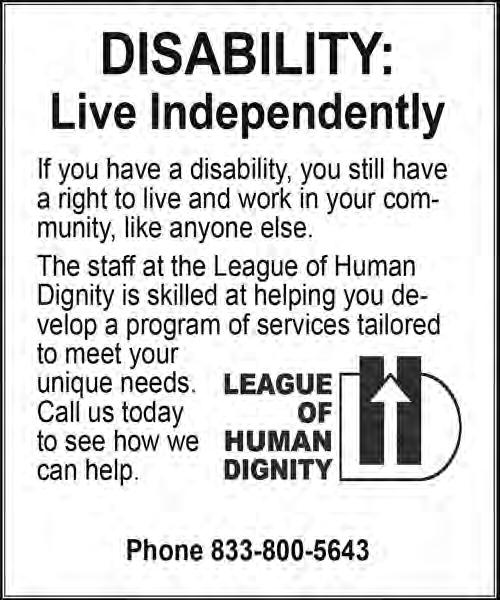



CLASSIFIED ADVERTISING works! Place your 25 word ad into thousands of Nebraska homes for $225. Contact the Jewish Press or call 1-800-369-2850.
HELLO NEBRASKA! Introducing www.nepublicnotices.com, a new public notice website presented as a public service by all Nebraska newspapers. Free access, fully searchable – because democracy depends upon open government and your right to know.
AFFORDABLE PRESS Release service. Send your message to 155 newspapers across Nebraska for one low price! Call 1-800-3692850 or www.nebpress.com for more details.
SWITCH AND save up to $250/year on your talk, text and data. No contract and no hidden fees. Unlimited talk and text with flexible data plans. Premium nationwide coverage. 100% U.S. based customer service. For more information, call 1-877-768-5892.
PORTABLE OXYGEN Concentrator? May be covered by Medicare! Reclaim independence and mobility with the compact design and long-lasting battery of Inogen One. Free information kit! Call 855385-3580.
PREPARE FOR power outages today with a Generac Home Standby Generator. Act now to receive a FREE 5-Year warranty with qualifying purchase. Call 1-402-899-2584 today to schedule a free quote. It’s not just a generator. It’s a power move.
GUN SHOW: October 18-20, 2024, Westfair, Council Bluffs, IA Fri 4-9pm, Sat. 9am-5pm, Sun. 9am-3pm. $10 (under 14 FREE). More info: 563-608-4401 www.marvkrauspromotions.net
DOES YOUR basement or crawl space need some attention? Call Thrasher Foundation Repair! A permanent solution for waterproofing, failing foundations, sinking concrete and nasty crawl spaces. FREE Inspection & Same Day Estimate. $250 off ANY project with code GET250. Call 1-844-958-3431.
THE BATHROOM of your dreams in as little as 1 day. Limited Time Offer - $1000 off or No Payments and No Interest for 18 months for customers who qualify. BCI Bath & Shower. Many options available. Quality materials & professional installation. Senior & Military Discounts Available. Call Today! 1-855-451-2244
WANTEDTOBUY
DEBORAH DANAN TEL AVIV | JTA
Sigal Manzuri chose not to be in Israel on Oct. 7. Instead, she accepted an invitation to deliver a speech at the United Nations building in New York, marking the unveiling of a photography exhibition that commemorates the stories of 25 victims, including her two daughters, Norelle Manzuri, 25, and Roya Manzuri, 22, dual American-Israeli citizens who were murdered by Hamas terrorists at the Nova music festival.
The decision wasn’t easy, but Sigal said she felt that honoring Norelle and Roya’s memory and spreading a message of unity — among all peoples — outweighed everything else.
“The biggest thing that scares me is that time is passing. It’s a year later and suddenly it’s old news,” she said. “I’m very, very scared that this whole tragedy will dissolve into thin air, and suddenly I’ll wake up and they won’t be spoken about any more.”
Sigal always speaks of the victims as a trio: her two daughters and Norelle’s boyfriend Amit Cohen, who had planned to propose on Norelle’s birthday. The three were inseparable and the only small comfort Sigal has, she said, is the belief that they are still together.
In addition to Oct. 7, Sigal, her husband Manny and son Shai will commemorate Oct. 9, 12 and 15, the dates of the trio’s funerals. Sigal was sitting shiva for Roya and fearing that Norelle had been taken captive when she joined a Zoom call with President Joe Biden and the families of other American hostages. During the call, a knock on the door brought the news that Norelle had also been killed.
“I told Joe Biden that for us it was too late,” Sigal recalled, adding that Biden buried his face in his hands and wept. Since that day, the Manzuri family’s entire raison d’etre is their murdered loved ones. “Everything I do revolves around Oct. 7,” she said.
Both Sigal and Manny left their jobs as an interior designer and contractor, respectively, and their remaining son, Shai, 15,
dropped out of high school. For Sigal, their mission carried out from their home base in the central Israel city of Hod Hasharon — goes beyond memory preservation.
“We are devoting our own lives to continuing the lives of our daughters and Amit,” she said.
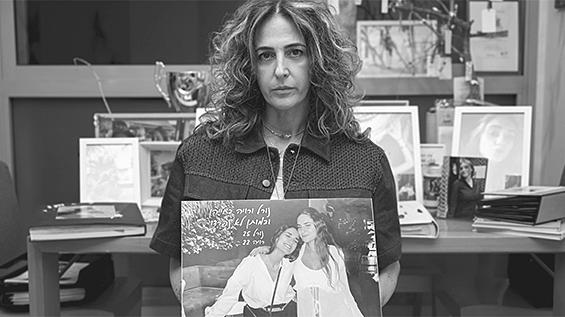
The endeavor has taken her to different cities to share their story, with a demanding and ever-changing schedule, though she said she strives to maintain some sense of routine for Shai. She described her son as a source of strength, always ensuring she eats, rests, and slows down when needed, but expressed sadness that he keeps his own pain hidden. A recent stop to be part of the Nova Exhibition in Los Angeles was particularly fraught, she said, because it was home for many years. The family immigrated to Israel in 2010, when the girls were fourth and sixth graders at Temple Israel of Hollywood’s Jewish day school. Sigal’s voice lifts when she speaks of her daughters. Both were creative —Norelle in fashion and Roya in jewelry design and film — and they shared a dream of blending their artistic talents with psychology as a form of therapy. From a young
age, Norelle was her “best friend,” Sivan said, and an anchor for everyone around her. A natural performer who loved acting, singing and dancing, Roya was “like a fairy, with a kind of magic that touched everyone.”
“I’ve always felt very lucky that they chose me as their mother, that they came into the world through me,” she said.
Like other grieving families, Sigal finds milestones like birthdays — which in Norelle’s case would have coincided with Amit’s proposal — especially painful. “ To mark these days without them is cruel. It requires a lot of strength but on the other hand, you can’t just let them pass you by.” Even routine events, like Friday night dinners, are hard. “There were six of us around the table. Suddenly we’re half a family, because half of us were murdered.”
She described the pain as something that can strike so intensely it feels like it’s breaking her. When alone, she allows herself to break down, but around others, hides her emotions.
“It’s not just emotional pain, it’s physical, and it can come without warning.” Though she tries to shield herself from the constant news of the war, the mounting death toll has still pierced her personal grief. “I’ve realized the heart can break over and over — and still keep holding it all,” she said.
While she seeks justice for those responsible, she makes a clear distinction between justice and revenge, saying she feels no anger and asks no questions — neither of the country’s leadership nor of God.
“This is bigger than any of us. The only thing I ask for is guidance on how to stay faithful to my heart and not get lost.”
Motherhood defines her, she said, and even as she cares for Shai, she will extend that role to her friends’ children and nephews. Alongside preserving her daughters’ legacy, that is what will keep her moving forward, she said.
“If there’s anything I’m proud of in this life, it’s my children. Nothing else in my life was ever as meaningful as them. The realization that now I’m a grieving mother is crushing.”
Reporter: up to $36
Molline Cassman
Helen Epstein
Becca and David Finkelstein
Claire and Pierre Flatowicz
Richard Goedeken
Susan Goldsmith
Elly Gordman
Marcia Kerrigan
Dana Knox
Debra Kutler
Jeff Schweid
Claudia Sherman
Susie and Jim Silverman
Michelle Whyte
Trich and Stewart Winograd
Jeremy Wright
Editor: $37-$180
Kathy Beauchaine
Mark Bernstien
Claire and Larry Blass
Janey Dann
Judith Feigin
Pam and Ron Feldman
Ally Freeman and Geoff Silverstein
Leanne and Frank Goldberg
Kim and Bob Goldberg
Mary Sue and Alex Grossman
Margie and Bruce Gutnik
Randi Jablin
Vicky Klein
Alice and Harold Kosowsky
Sam Kricsfeld
Lisa and Chuck Lucoff
Shayna Ray
Larry Ring
Lynne and Errol Saltzman
Melissa and Michael Shrago
Ray Somberg
Publisher: $181-$360
Marlene and David Cohen
Joanie and Richard Jacobson
Fran and Rich Juro
Bob Rifkin
Nancy and Joel Schlessinger
Gold Sponsor: $500 and up
Bruce Belgrade
Amy and Sandy Friedman
Gloria and Howard Kaslow
Abby and Adam Kutler
Howard Kutler
Sissy Silber